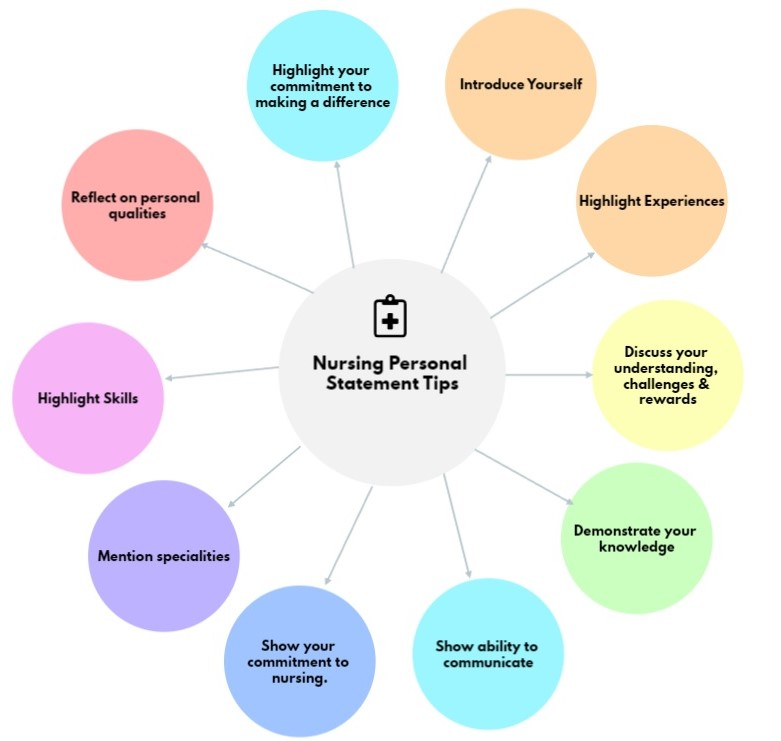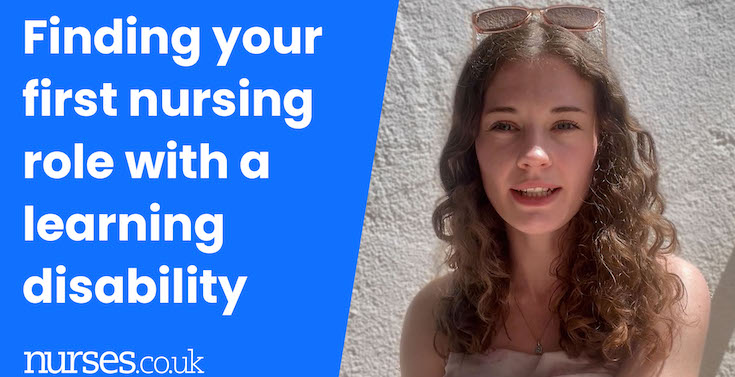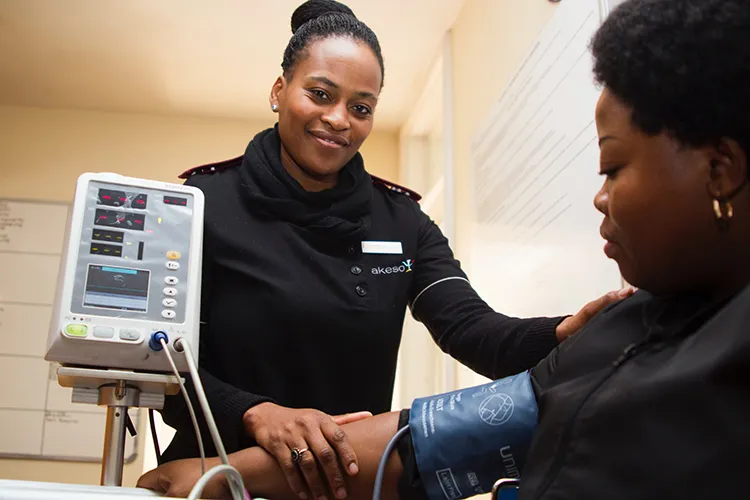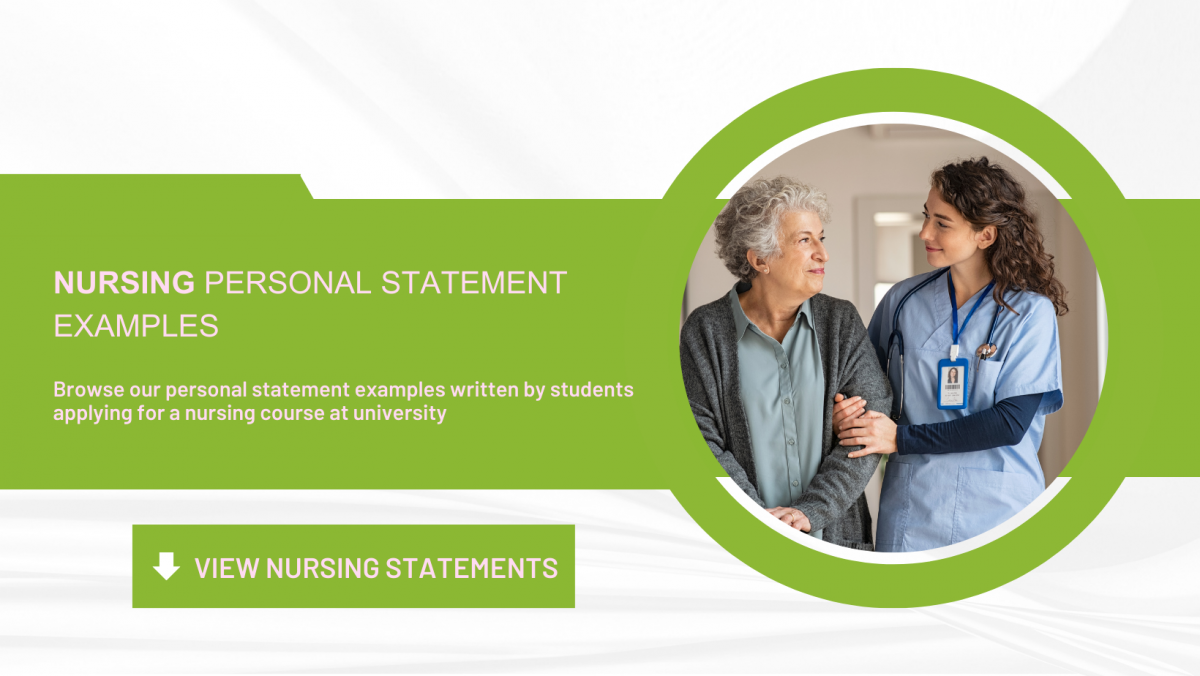Nursing Bay
College personal statement examples and writing tips.
A crucial step in your nursing journey is learning how to write a personal statement that resonates with admissions committees and vividly portrays your passion for healthcare. This collection of amazing personal statement examples is curated to guide and inspire you as you articulate your aspirations, experiences, and motivation to pursue nursing.

What is a Personal Statement?
A personal statement is a written narrative that typically forms a significant part of an application to universities, colleges, or professional programs, particularly in fields like nursing. It’s an opportunity for junior year applicants to present themselves beyond test scores and grades, offering insights into their personalities, experiences, goals, and motivations.
In a personal statement, applicants explain why they are interested in a specific field of study or profession, what they hope to achieve through the program, and how their background and experiences have prepared them for this path. It’s a chance to highlight unique attributes, significant life experiences, challenges overcome, or special achievements that make them an ideal candidate for the program.
Why Read Personal Statement Examples?
Reading personal statement essay examples is immensely beneficial for several reasons, especially when preparing your own statement for applications to nursing programs:
- Inspiration and Ideas: Examples can inspire you and provide ideas on structuring your statement, what kind of content to include in your application essay, and how to convey your story and passion effectively.
- Understanding Expectations: They offer insight into what admissions committees look for, helping you understand the level of detail, tone, and approach that resonates successfully in such applications.
- Learning from Others: Seeing how others have articulated their experiences, challenges, and aspirations can guide you in reflecting upon and articulating your own journey and motivations.
- Avoiding Common Mistakes: By examining a range of examples, you can identify common pitfalls and clichés to avoid, ensuring your statement stands out and feels genuine.
- Gaining Confidence: Reading successful common app essays can boost your confidence, showing you that crafting a compelling narrative that combines personal experiences with professional aspirations is possible.
- Diverse Perspectives: Examples offer a glimpse into the diversity of paths and motivations that lead people to nursing, potentially broadening your perspective and enriching your own approach to writing your statement.
How Long Should a Personal Statement Be?
The length of your personal statement should ideally align with the guidelines provided by the institution or program you are applying to. Personal statements are expected to be concise yet comprehensive, often ranging around 500 to 650 words , translating to about one to two pages.
This word count allows enough space to clearly articulate your experiences, motivations, and aspirations without overloading the reader with information. It’s important to always adhere to the program’s specific word or character limits to demonstrate your ability to follow instructions and present your thoughts.
What Should a Personal Statement Include?
A well-written college admissions essay should include several key elements to effectively communicate your suitability for the program or position you are applying for. Here’s what to typically include:
Introduction
Your personal statement should begin with an engaging introductory paragraph that captures the essence of your motivation for pursuing your chosen field. This could be a brief narrative of a defining moment, an experience that ignited your passion, or a clear articulation of your interest and enthusiasm.
The introduction sets the tone and should intrigue the reader, providing a glimpse into your unique journey and motivation. It’s important that this section hooks the reader’s attention and provides a compelling reason to continue reading your statement.
Academic and Professional Background
In this section, brainstorm and detail your relevant academic and professional experiences that have prepared you for this next step. Highlight key academic achievements, coursework, research, or projects that align with the field you are pursuing.
Also, include any relevant work experience, internships, or positions that have given you practical skills and insights. This part of the statement is crucial for showcasing your foundational knowledge and preparedness for advanced study or professional development and gaining a scholarship in your chosen area.
Extracurricular Activities and Volunteering
Your involvement in extracurricular activities and volunteering can significantly enrich your personal statement. This section should reflect how these activities have contributed to your personal growth, skills development, or understanding of your field.
Whether it’s a hobby, leadership roles in clubs, participation in sports teams, or volunteer work in community organizations, these experiences demonstrate your broader interests, commitment, and ability to balance multiple responsibilities. It’s an opportunity to show aspects of your character and values that academic achievements alone might not convey.
Personal Qualities and Skills
Reflect on and draft the personal qualities and skills that make you suited for your chosen path. This might include traits like resilience, empathy, critical thinking, or effective communication. Use specific examples or experiences to demonstrate how you have developed and applied these traits.
This personal reflection not only provides depth to your statement but also gives the admissions committee a clearer picture of who you are as an individual, beyond academic and professional achievements.
Career Goals and Aspirations
Discuss your career aspirations and how the program or position you are applying for aligns with these goals. This section should convey a clear vision of where you see yourself in the future and how the specific program or role will be a stepping stone toward that vision.
It’s important to show that you have a direction and purpose and that you see this opportunity as integral to your career journey. This not only demonstrates foresight and planning but also shows your commitment and seriousness about the path you are choosing.
Reasons for Choosing the Specific Program or Institution
Clearly articulate why you are applying to this particular program or institution. Discuss what specific aspects of the program, faculty, institution’s philosophy, or opportunities available are particularly attractive to you and why they resonate with your goals and preferences.
This shows that you have done your research and are making a well-informed decision. It also indicates that you have a genuine interest in what the program or institution uniquely offers, rather than a generic application.
Conclude your statement with a strong, memorable closing that encapsulates your main points and reaffirms your enthusiasm and suitability for the program or career. This is your final opportunity to leave a lasting impression, summarizing why you believe you are an ideal candidate.
The conclusion should tie back to your opening, creating a cohesive narrative that leaves the reader with a clear understanding of your passion, commitment, and readiness for the next step in your academic or professional journey.
What Does an Admissions Officer Look for in a Personal Statement?
When reviewing a personal statement, admission officers are looking for several key elements to assess the suitability of a candidate for their program:
- Clarity of Purpose: Admissions officers want to see a clear understanding of why the applicant wants to pursue a particular field or program. The statement should convincingly articulate the candidate’s passion, motivation, and how the program aligns with their career goals.
- Personal Insight and Self-Reflection: A strong personal essay offers insight into the applicant’s personality, experiences, and the factors that have shaped their decision to pursue a specific path. Admissions officers look for depth of reflection and a sense of how past experiences have driven the candidate’s current ambitions.
- Relevant Experience and Skills: It’s important for the statement to highlight any relevant academic, professional, or volunteer experiences that demonstrate preparedness for the program. Admissions officers are interested in how these experiences have contributed to the development of skills and knowledge pertinent to the field.
- Writing Quality and Structure: The ability to communicate effectively and coherently through writing is crucial. Admissions officers pay attention to the overall quality of writing, including grammar, clarity, coherence, and the ability to organize thoughts logically.
- Individuality and Authenticity: They seek to understand what makes each applicant unique. A personal statement should reflect the individual’s authentic self, showcasing unique perspectives, diverse experiences, and personal growth.
- Commitment and Passion: Demonstrating genuine enthusiasm and a strong commitment to the field is essential. Admissions officers look for candidates who are likely to thrive in the program and contribute positively to their field.
- Alignment with Program Values and Goals: Candidates who show that their personal and professional values align with those of the program or institution often stand out. Admissions officers look for indications that the candidate has researched the program and understands how it fits into their broader aspirations.
- Future Potential: Finally, they are interested in the applicant’s potential for future success and contribution to the field. A compelling statement should give a sense of the candidate’s ambition to go to college and how they intend to utilize the education and opportunities provided by the program to achieve their long-term goals.
The Best Personal Statement Examples
Here are some examples that illustrate effective writing styles, clear articulation of goals, and the ability to connect personal experiences to broader career or academic aspirations:
Personal Statement Example #1
Personal statement example #2, college essay example #3, personal statement example #4, application essay example #5, personal statement example #6, personal statement example #7, personal statement example #8, personal statement example #9, personal statement example #10, personal statement example #11, personal statement example #12, personal statement example #13, personal statement example #14, personal statement example #15, key takeaways for writing a great personal statement.
When reflecting on the nursing personal statement examples provided, several key takeaways emerge that are crucial for anyone crafting their statement. These insights are vital for effectively conveying your passion, commitment, and suitability for a career in nursing:
- Clearly articulate your personal motivation for choosing nursing.
- Highlight your relevant healthcare experiences and achievements.
- Specify your interest in any particular nursing specialty.
- Showcase qualities and skills that make you suitable for nursing.
- Outline your long-term professional aspirations in nursing.
- Acknowledge the challenges and rewards in the nursing profession.
- Express dedication to ongoing learning and professional development.
- Ensure clarity, structure, and coherence in your statement.
- Customize your statement for each specific nursing program.
- Maintain authenticity and genuineness throughout your statement.
Final Thoughts: Personal Statement Essay Examples
These nursing personal statement examples and key takeaways provide valuable insights for anyone aspiring to enter the nursing freshman year. They demonstrate the importance of a well-crafted statement that blends personal motivation, relevant experiences, and a clear understanding of the nursing profession’s demands and rewards.
An effective personal statement is not only a reflection of your qualifications and aspirations but also a testament to your passion, empathy, and commitment to the field of nursing. It’s a unique opportunity to showcase your individuality and suitability for a career that is as challenging as it is rewarding.

- +44 (0) 207 391 9037
- UCAS personal statements
- Oxbridge Personal Statements
- Specialist Personal Statements
- Postgraduate Applications
- Services for Education Agencies
- Personal Statements
- Professional
- Specialist Applications
How to Write a Nursing Personal Statement
28th May 2024
Speak right now to our live team of English staff

Writing a nursing personal statement is a critical step in your journey to becoming a nurse. It’s your opportunity to demonstrate why you are passionate about nursing and how your experiences and aspirations align with the goals of the nursing school you are applying to. This article will guide you through crafting a compelling personal statement for nursing school, ensuring that your application stands out in a competitive field.
Understanding the Purpose of Your Nursing Personal Statement
The primary goal of a nursing personal statement is to highlight your dedication to nursing as a career and to show admissions committees why you would be a valuable addition to their school. This document should reflect both your academic achievements and the personal qualities that make you suited to nursing, such as empathy, resilience, and a strong desire to help others.
Preparing to Write
Before you start writing your nursing personal statement, it’s essential to understand what nursing programmes are looking for. Nursing schools want candidates with strong interpersonal skills, a commitment to healthcare, and a clear understanding of nursing. Start by reflecting on your experiences that relate to nursing, including any volunteer work, previous coursework, or personal experiences in medical settings.
How to Start a Personal Statement for Nursing
Opening your nursing personal statement is your first chance to make an impression. Begin with a strong hook—an anecdote, a compelling fact, or a poignant experience directly related to nursing. It could be a personal experience that inspired your choice to pursue nursing or an observation from your experiences that shaped your understanding of what makes a good nurse.
Example : “The moment I handed the newborn to her mother, feeling the tangible impact of care and compassion in the maternity ward, I knew my career had to be in nursing.”
Structuring Your Personal Statement
A well-structured personal statement for nursing school should flow logically and cover several key areas:
1. Introduction: This section should include your initial hook and a brief overview of why you are drawn to nursing.
2. Body Paragraphs:
- Motivation for Nursing: Discuss what drives your interest in nursing. Incorporate personal narratives or experiences that demonstrate your passion and commitment.
- Academic Preparedness: Highlight any academic achievements or specific coursework relevant to nursing. It might include sciences like biology or psychology, which are pertinent to the nursing field.
- Relevant Skills and Qualities: Outline the qualities that make you a good fit for nursing, such as empathy, patience, and the ability to work under pressure. Use examples from your experiences to highlight these traits.
- Professional Experience: Include any healthcare-related work or volunteer work that has prepared you for a nursing career. Describe what these experiences taught you about the profession and how they have shaped your career aspirations.
3. Conclusion: Summarise your vital points and restate your enthusiasm for becoming a nurse. Make a compelling case for why the school should choose you over other candidates.
Crafting the Perfect Nursing Personal Statement
To create a perfect personal statement in nursing, consider these five crucial points:
- Personal Reflection: Begin with a deep introspection of your unique experiences. Identify moments in your life that have distinctly influenced your decision to pursue nursing—whether it was an inspiring encounter with a healthcare professional or a personal experience caring for a loved one.
- Specific Examples: Instead of broad descriptions, detail specific scenarios highlighting your skills and determination. For example, discuss a particular instance when you managed a stressful medical situation or contributed to a team during a critical event. These stories add authenticity and depth to your statement.
- Professional Tone: A formal yet approachable tone throughout your nursing personal statement is essential. It demonstrates your professionalism and respect for the nursing profession. A serious tone underscores the sincerity of your commitment to healthcare.
- Structural Integrity: Logically organise your statement. Each paragraph should flow naturally into the next, with clear transitions and structured development of ideas. This coherence shows that you can communicate effectively, a vital skill for any nurse.
- Focus on the Future: While reflecting on past experiences is essential, articulate your future aspirations in nursing. Include details of how your previous experiences have prepared you for the challenges of a nursing career and how they’ve motivated you to advance within the field.
Editing and Refining
To effectively edit and refine your nursing personal statement follow these five steps:
- Take a Break: After completing your draft, take a few days. You’ll return to your text with a fresh perspective, thus making it easier to spot areas for improvement.
- Seek Feedback: Review your statement with mentors, educators, or peers with nursing or admissions experience. Their expert insights can offer valuable perspectives on enhancing the clarity and impact of your narrative.
- Focus on Motivation and Persuasiveness: During the review process, consider how your motivations for pursuing nursing are articulated. Ensure your reasons are compelling and that your experiences robustly support your aspirations.
- Smooth Transitions: Carefully review the transitions between paragraphs, ensuring they are smooth and logical. Good transitions help maintain the flow of your narrative, making your statement more readable and engaging.
- Grammar and Style Checks: Lastly, thoroughly check grammatical errors and style consistency. Consider using professional editing tools or services to polish your statement to perfection. A well-edited personal statement for nursing school reflects your attention to detail and commitment to presenting your best self.
The Value of Professional Assistance
As you finalise your nursing personal statement, consider the value of professional personal statement writing services. Crafting a statement that genuinely stands out requires introspection, technical writing skills, and an understanding of what admissions committees prioritise. Professional editors or experienced mentors in the field of nursing can offer substantial improvements to both the content and structure of your statement.
These experts can help refine your narrative, ensuring that it meets the high standards of nursing schools and showcases your unique qualifications and passion for nursing. Taking professional help can be a decisive step towards ensuring that your personal statement is polished, persuasive, and poised to make a memorable impact.
Oxbridge Personal Statements: Your Pathway to Success
Elevate your nursing application with the unparalleled expertise of Oxbridge Personal Statements . Our team of skilled experts, who bring years of experience from top universities, specialise in crafting perfect nursing personal statements that resonate with admissions panels. Whether you are just starting to learn how to write a nursing personal statement or looking to refine an existing draft, our services are designed to meet your needs.
Reach your potential with a personal statement highlighting your dedication, skills, and readiness for nursing. At Oxbridge Personal Statements, we provide personalised guidance and strategic insights that transform your personal experiences into compelling stories of passion and purpose. Tell us your requirements and let us help you make a solid and positive impression that will make the way for your success in nursing school.
You may also like...

How to End a Personal Statement to Make an Impact? Beginner Guide

Things to Include in Your Personal Statement

Crafting Your Future: Strategies for UCAS Personal Statements

Band 6 Nurse Personal Statement Examples & Tips | Get Helpful Advice from CVLocum
Get a Head Start on Writing Your Nurse Personal Statement with our Band 5, 6, and 7 Examples.
A nursing personal statement is one of the essential elements of a successful nursing application. It is a chance to showcase your skills, knowledge, and experiences that make you the best possible candidate for the course and the profession.
For a band 6 nursing personal statement, you need to provide detailed evidence of your abilities, including communication skills, multi disciplinary working, and evidence-based practice. In this blog post, we will explore some successful examples of band 6 nurse personal statements, highlighting what you should include and how you can make your statement unique.
What to Include in a Nursing Personal Statement
Writing an effective personal statement is important because it serves as a reflection of one’s passion, commitment, and suitability for a career in nursing.
It provides an opportunity to showcase relevant experiences, skills, and qualities that make an individual a strong candidate for nursing school or a nursing position. A well-crafted personal statement allows applicants to convey their understanding of the nursing profession, their motivation for choosing this path, and their potential to contribute to the field.
It helps admissions committees and employers gain insight into an applicant’s character, values, and potential for success as a registered nurse. A compelling personal statement can set an applicant apart from others and demonstrate their genuine desire to make a positive impact on the lives of patients and the healthcare community as a whole.

Related: Crafting the Perfect CV Nurse Writing Tips, Templates and examples included.
Related: 11 Example Nurse Safeguarding Questions for Interview + Answers | CVLocum
It is worth mentioning these important points when writing your nursing personal statement:
– Introduce yourself and explain your passion for nursing.
– Highlight any relevant experiences, such as clinical placements or healthcare volunteering, and describe how they have shaped your desire to pursue nursing as a career.
– Discuss your understanding of the nursing profession, including the challenges and rewards it entails.
– Demonstrate your knowledge of and commitment to providing compassionate and patient-centred care.
– Emphasise your ability to communicate effectively with patients, families, and a multi disciplinary team.
– Showcase your dedication to lifelong learning and medical profession development in the field of nursing.
– Discuss any specific areas of nursing that you are particularly interested in or have experience in, such as adult nursing, mental health nursing, or paediatric nursing.
– Highlight any relevant skills and qualities, such as empathy, resilience, problem-solving, and critical thinking.
– Reflect on any personal qualities or experiences that have prepared you for a career in nursing, such as being a good listener, working well under pressure, or being able to adapt to changing situations.
– Conclude by summarising your commitment to making a positive difference in the lives of patients and your enthusiasm for embarking on a nursing career.

Example of Band 6 Personal Statement:
A Band 6 person statement may differ from other bands as it represents a higher level of experience, expertise, and responsibility. As a Band 6 Registered nurse, you are expected to demonstrate advanced clinical skills, leadership abilities, and the capacity to work autonomously.
Additionally, showcasing your ability to adapt to changing healthcare environments and your dedication to delivering person-centred care will set you apart as a strong candidate for a Band 6 nursing role.
Band 6 Personal Statement Example 1:
”As a dedicated and compassionate nurse, I am excited to apply for the Band 6 position in your hospital. With several years of experience working in various healthcare settings, I have developed a deep understanding of patient care and a passion for delivering high-quality services.
My clinical expertise extends across different specialties, including medical-surgical, paediatric, and geriatric nursing. I pride myself on my ability to establish therapeutic relationships with patients and their families, providing empathetic and patient-centred care.
My goal is to contribute to the enhancement of healthcare delivery, advocate for patient rights, and promote evidence-based practice. I believe that my experience, skills, and passion make me a strong candidate for the Band 6 role, and I am eager to contribute to the team and make a positive difference in the lives of patients”
Band 6 Personal Statement Example 2:
”As an experienced nurse with a strong passion for patient care since a young age, I am enthusiastic about the opportunity to join the your team. With a solid foundation in various healthcare settings, I possess the skills and knowledge necessary to provide compassionate and evidence-based care.
My commitment to continuous professional development ensures that I stay up-to-date with the latest advancements in nursing practice. I thrive in collaborative environments and am dedicated to working alongside interdisciplinary teams to achieve optimal patient outcomes.
With a patient-centred approach and a focus on delivering high-quality care, I am confident in my ability to make a positive impact as a Band 6 nurse.”

Adult Nursing Personal Statement Example:
Your adult nursing personal statement should highlight your knowledge and skills related to adult care. Additionally, showcasing your understanding of the unique challenges and needs of adult patients.
Your personal statement should also highlight your commitment to continuing professional development and your dedication to staying updated with evidence-based practices in adult nursing.
Adult Nursing Personal Statement Example 1:
”I have always been passionate about providing high-quality care to individuals during their most vulnerable moments. As an aspiring adult nurse in the UK, I am dedicated to making a positive impact on the lives of adult patients and their families in your nursing home.
I possess excellent communication skills, enabling me to establish trusting relationships with patients and effectively collaborate with interdisciplinary teams. My empathetic nature and ability to remain calm under pressure allow me to provide compassionate support to patients facing challenging health conditions.
With a commitment to lifelong learning and a desire to continuously enhance my skills, I am eager to embark on the next step of my career as an adult nurse, contributing to the well-being of individuals in need.”
Adult Nursing Example 2:
”I am a dedicated and compassionate nurse and particularly a nurse for elderly patients. Through my experience as a healthcare assistant, I have developed essential skills in administering medications, providing personal care, and supporting patients with diverse needs.
I possess excellent communication and teamwork abilities, which enable me to establish rapport with patients and collaborate effectively with healthcare professionals. With a focus on delivering patient-centred care, I am committed to upholding the highest standards of nursing practice.
I am excited to embark on the next chapter of my career as an adult nurse in your nursing home and make a positive impact on the lives of individuals in need.”
Example of Band 5 Personal Statement:
Band 5 personal statement example 1:.
”As an enthusiastic and dedicated nurse, I am excited to start my career as a Band 5 nurse after completing my nursing degree. With extensive experience in various healthcare settings, including medical-surgical units and mental health facilities, I possess strong assessment and medication administration skills.
I excel in building rapport with patients, families, and interdisciplinary teams, prioritising effective communication. Committed to lifelong learning, I stay updated with evidence-based practices to provide high-quality care.
With my passion for nursing and drive for continuous improvement, I am ready to make a positive impact as part of a healthcare team as that is where my own personal fulfilment lies.”
Band 5 Example 2:
”As a passionate and caring individual, I am thrilled to embark on my journey as a Band 5 nurse. With a solid foundation in nursing education and hands-on clinical experience, I have honed my skills.
I am adept at fostering therapeutic relationships with patients and their families, providing emotional support, and promoting their well-being. Collaborating effectively with healthcare teams is a priority for me, as I believe in the power of multidisciplinary care to achieve optimal patient outcomes.
Through ongoing professional development and a commitment to evidence-based practice, I strive to deliver compassionate and patient-centred care. With a strong work ethic and a genuine passion for nursing, I am eager to contribute to the healthcare profession.”
Example of Band 7 Personal Statement:
Band 7 personal statement example 1:.
”As an experienced Band 7 nurse, I am dedicated to delivering exceptional patient care, leading quality improvement initiatives, and mentoring junior staff.
With advanced clinical expertise and a commitment to ongoing professional development, I strive to enhance patient outcomes through evidence-based practices. By fostering collaborative relationships and prioritising patient well-being, I create a supportive and innovative healthcare environment.
I am eager to utilise my skills and passion for nursing to make a positive impact.”
Band 7 Example 2:
”As a Band 7 nurse, I want to feel a high level of job satisfaction in a rewarding field of healthcare, I possess extensive clinical knowledge and leadership skills that enable me to deliver high-quality care and drive positive change in healthcare settings.
With a focus on evidence-based practice, I continuously seek opportunities for professional development and stay abreast of advancements in nursing. Through effective communication, teamwork, and a patient-centred approach, I strive to provide personalised care and create a supportive environment for both patients and colleagues.
With a strong commitment to excellence and a passion for nursing, I am dedicated to making a meaningful impact in the field.”

Conclusion:
In conclusion, a nursing personal statement is a chance to showcase your skill sets, knowledge, and nursing experience that make you the best possible candidate for the profession. Emphasise your passion, commitment, and desire to provide the best possible care for patients.
Good luck in your journey towards becoming a great nurse!
Ready to find a Job and Enhance Your Nursing Career?
To find a job, you can browse our job board with hundreds of Nursing roles waiting for someone like you!

Healthcare Assistant Isle of Man £24,965p/a+
Band 5 nurse | hillingdon | £22.04 – £28.67p/h, band 5 nurse | cheshire | £19.06 – £35.52p/h, theatre nurse stockport £30p/h+, scrub nurse wigan £30p/h+, renal nurse oldham £40p/h+, registered mental health nurse salford £20p/h+, registered general nurse rochdale £30p/h+, recovery nurse sale £30p/h+.

- Application Requirements
- Tuition & Financial Aid
- Transfer Credits
- Financial Aid FAQ
- What Can You Do With a Computer Science Degree?
- What Can You Do With a Marketing Degree?
- What Is RN to BSN
- Curriculum & Practical Experiences
- Double Shark Scholarship
- Leadership & Faculty
- Career Services
- How To Become a Behavior Analyst
- Library and Information Science (MS)
- Curriculum & In-Person Experiences
- What is an FNP?
- Course Sequence Page
- Course Description
- Nutrition and Health Promotion (MS)
- Behavior Analysis (PhD)
- Apply Now External link: open_in_new
Home / Blog
Tips for Writing a Great Nursing Personal Statement
When preparing to apply to a graduate nursing program, there are many requirements and submission guidelines to remember. The component that allows you to tell your unique story — your personal statement — is one of the most important.
Writing a compelling personal statement for an MSN program, like the Nursing@Simmons online Family Nurse Practitioner (FNP) or Psychiatric Mental Health Nurse Practitioner programs, takes time and can be challenging for some applicants. Just as a poorly written essay can hinder your chances of acceptance, a great one can set you apart from other applicants. Below are three steps to writing a personal statement that will make a positive impression on any admissions committee.
1. Plan Your Story
Very few people can sit down at a keyboard and craft the perfect personal statement without preparation. It may take several weeks of thinking about how to communicate your story, so give yourself plenty of time to plan, jot down thoughts, and make an outline as ideas come to you. Use the following tips to gather the information you’ll need to create an excellent statement.
- Consider how your work experience as a registered nurse (RN) has influenced you and shaped your goals for the future. How will an advanced education promote your professional growth and help you transition into the role of an FNP or PMHNP?
- Think beyond your resume. What traits, strengths, and accomplishments aren’t captured there? Consider your interests, including how they will contribute to your success in the program. Provide examples of nursing goals, leadership, mentorship, or growth you have accomplished or experienced. Write these down and keep them in mind as you begin your draft.
- Choose appropriate topics for your statement. Avoid soapbox issues, and don’t preach to your reader. This kind of statement can come across as condescending and obscure the point you’re trying to make.
- Research the program. Make sure you understand the school’s values and reputation. Do they align with yours? How so?
2. Create Your Draft
- When it is time to start putting your thoughts on paper, try to avoid overthinking your work. Strive for a natural voice. Pretend you are talking to a friend and write without fear — you can edit and polish your piece to perfection in the next stage.
- Avoid cliches and nursing generalities. Generic descriptors, such as “caring,” “compassionate,” “people person,” and “unique,” have been so often overused that they no longer carry much weight with an admissions committee. They also don’t address your personal experience in the nursing sphere. Try not to start your story with phrases like “for as long as I can remember” or your audience may stop reading.
- Show, don’t tell. Strong storytelling is grounded in personal details that illustrate who you are, both as a nurse and a person. Be specific by describing how many patients you managed, how you earned promotions, or a time when your supervisor praised your professionalism and clinical abilities. Here are examples that illustrate the difference between telling and showing:
“I perform well under pressure.”
“Although my patient arrived for a different ailment, I suspected that her symptoms were consistent with a serious infection. As a result, I was able to advocate for a care plan that prevented further damage.”
- Use specific examples when talking about your experience with direct patient care and evidence-based practice. Provide details about how your clinical experiences have demonstrated patient advocacy, leadership, communication, or confidence.
- Discuss how earning a Master of Science in Nursing aligns with your career plans and why you want to become a FNP or PMHNP . Explain that you understand the commitment required and that you have the skills and dedication to become an FNP or PMHNP. Be sure to let the admissions committee know why you are choosing their program and what makes their program stand apart from the rest. Reflect on the school and program research you did during your planning stage.
3. Edit and Perfect
Even the best writers have to edit and polish their work. Reviewing and revising your personal statement ensures that the piece is clear, organized, and free of errors.
- Once you have written your first draft, take a break and distance yourself from your work. This will allow you to return to the draft with a clear head to review objectively and spot potential issues and errors.
- Read your statement aloud. Does it sound like you? Does it reflect your best qualities and the strengths you’ll bring to a nursing program?
- Always use spell check on your essay, but be careful as it won’t catch every spelling error.
- Use a grammar editing tool, such as Grammarly .
- Ask a friend, family member, or mentor to review your statement. This is a great way to catch errors or awkward phrasing that you may have missed.
Your nursing personal statement should be a window into your life. Use it to share specific experiences that have influenced your decision to advance your nursing education. Adhering to professional standards and presenting yourself in a positive, open, and honest way will help the admissions committee determine your fit and future in an FNP or PMHNP program.
Request Information
- Personal statement advice: nursing
Applying to university
- Getting started
- UCAS Tariff points
- Calculate your UCAS Tariff points
- Amendments to the Tariff consultation
- Offer rate calculator
- How to use the offer rate calculator
- Understanding historical entry grades data
- Admissions tests
- Deferred entry
- Personal statement advice and example: computer science
- Personal statement advice: English
- Personal statement advice: Midwifery
- Personal statement advice: animal science
- Personal statement advice: biology
- Personal statement advice: business and management
- Personal statement advice: chemistry
- Personal statement advice: dance
- Personal statement advice: dentistry
- Personal statement advice: drama
- Personal statement advice: economics
- Personal statement advice: engineering
- Personal statement advice: geography
- Personal statement advice: history
- Personal statement advice: law
- Personal statement advice: maths
- Personal statement advice: media studies and journalism
- Personal statement advice: medicine
- Personal statement advice: modern languages
- Personal statement advice: music
- Personal statement advice: pharmacy
- Personal statement advice: physiotherapy
- Personal statement advice: politics
- Personal statement advice: psychology
- Personal statement advice: social work
- Personal statement advice: sociology
- Personal statement advice: sports science
- Personal statement advice: statistics
- Personal statement advice: teacher training and education
- Personal statement advice: veterinary medicine
- Personal statement: finance and accounting
- Filling in your application
- Staying safe online
- How to write a personal statement that works for multiple courses
- How To Write Your Undergraduate Personal Statement
- Fraud and similarity
- How to start a personal statement: The attention grabber
- How to end your personal statement
- Introducing the personal statement tool
- Personal statement dos and don'ts
- What to include in a personal statement
- Using AI and ChatGPT to help you with your personal statement
- Using your personal statement beyond a university application
- Carers, estranged students, refugees, asylum seekers, and those with limited leave to remain
- Personal statement guides
- References for mature students
With this in mind, your personal statement should demonstrate a clear understanding of what the role involves, the challenges you’ll face, and the kind of skills, qualities, and values required.
We've asked admissions tutors to share their top dos and don'ts for nursing personal statements, and asked a careers adviser to create an example of how to write about your work experience – here's what they told us.
Nursing personal statement basics – what to include
To structure it, try to write clearly and reflectively about:
- how you arrived at your decision to go into nursing
- why, specifically, you want to be an adult, child, mental health, or learning disabilities nurse
- how your experience and research has contributed to your understanding of the realities and challenges you'll face
- what it is about your skills, attitudes, values, and character that make the profession right for you
- anything you feel is especially relevant about your academic studies, or maybe a project you've undertaken
Some universities will score your personal statement against their specific selection criteria. Make sure you take a look at individual university websites, as these criteria may be listed for you to refer to. Look for nursing courses in our search tool .
Writing about relevant experience
Try to build up as much experience or observation as you can. Ideally this should be in a care environment, such as a hospital, clinic, GP practice, school, residential care or the voluntary sector. Any other experience of working with people is helpful too.
Back up these experiences by carrying out some relevant background reading or research – Health Careers is a good starting point . Just talking to nurses about their work will also be valuable. Nurse Ewout talks about his route into nursing . If possible, get to some university open days , as they’re great for picking up new insights and asking questions.
Then, when you write about all this in your statement, try to explain and reflect on:
- what you’ve learned about some of the realities of nursing, the challenges, constraints, and frustrations you’ll face (rather than the rewards), and the skills, qualities, and values you’ll need
- how you’ve demonstrated some of those skills, qualities, and values yourself through your experience, extracurricular activities, personal interests or achievements
The latter could include the responsibility and commitment you’ve shown through:
- voluntary work
- the teamwork and interpersonal skills you’ve developed in your part-time job
- the empathy you’ve shown as a student mentor
- the leadership you’ve displayed as a guide or scout
- something specific that happened on a Duke of Edinburgh’s Award expedition, and so on
Tip: Don’t waste space in your statement explaining what a nurse does – they know that! But if you’ve found out for yourself how nurses manage, prescribe, evaluate or critically review evidence when making decisions, do reflect on that.
Focus on the field of nursing you're interested in
Most nursing admissions tutors expect you to apply for one specific field only, such as adult or child.
They'll expect you to choose between nursing and midwifery courses rather than apply to both at the same time. However, one university told us that you wouldn’t automatically be rejected if you are genuinely interested in the crossover between two different fields (same for nursing and midwifery), so do check first. Some universities also offer dual-field courses but you'll need to demonstrate a realistic understanding of the field(s) you’ve chosen.
For example, if you’re applying specifically for mental health nursing, you might want to reflect on your ability to understand other people’s perspectives or to advocate on their behalf. Or if you feel it’s appropriate to reflect on your own experience of mental health then, as one admissions tutor told us, the key is to explain how this has motivated you to become a nurse yourself.
For child nursing, you might wish to demonstrate your awareness of the diverse range of children you will nurse and the kind of challenges you expect to face. Similarly, for adult or learning disability, you could reflect on what you’ve learned from your interactions with elderly people, or how you’ve supported someone with a learning disability yourself.
The key words are ‘demonstrate’ and ‘reflect’. It’s not enough just to say you understand something – you need to show what it was that led to your understanding. Then, as Moira Davies, nursing admissions tutor at University of South Wales, advises, ‘highlight the skills you have that are transferable to the field of nursing you have chosen’.
If you’re interested in learning more about midwifery, read our guide .
Accuracy is vital
Nhs constitution.
For all degree courses that involve training within an NHS setting, there is likely to be some emphasis on values based selection, and how applicants' own values and behaviours align with the seven core values of the NHS Constitution . Familiarise yourself with this while writing your personal statement.
For more personal statement advice and examples, check out all our personal statement advice including how to write a personal statement and how to start yours .
Sponsored articles UCAS Media Service
Five reasons to sign up to the ucas newsletter, do you need to take an english test to study at university in the uk, degrees focusing on your employability.

Sign up to our Newsletter
How to write a personal statement for nursing school.

Reviewed by:
Jonathan Preminger
Former Admissions Committee Member, Hofstra-Northwell School of Medicine
Reviewed: 6/19/23
Writing a personal statement for nursing school can be a daunting task, but we’re here to help! Here’s everything you need to know about writing a personal statement for nursing school.
Writing your personal statement is a nerve-wracking experience, no matter what program you’re applying for . You may be wondering: “what are nursing schools looking for in a personal statement?” or, “how can I make my personal statement for nursing school stand out?” Lucky for you, we’ve got some answers.
Here we’ll cover everything you need to know about writing a personal statement for nursing school. We’ve included a breakdown of the components to include, examples of nursing school personal statements, and tips to improve your own.
Let’s get started!

Get The Ultimate Guide on Writing an Unforgettable Personal Statement

What Is a Nursing School Personal Statement?
When applying to nursing schools , you’ll most likely notice that most applications require a personal statement. A personal statement is a short essay, typically no longer than two pages, that tells your target schools a little bit about who you are.
Each school has different expectations for the length and contents of your personal statement, so make sure to check the specific requirements of your target schools. Some common topics include your personal goals for nursing school and why you want to become a nurse.
Nursing School Personal Statement Format
Before writing your personal statement for nursing school, you should plan out what you want to include. If your school does not ask you to answer a specific question with your essay, here is a list of what you should include in your nursing school personal statement.
An Introduction
The introductory paragraph should focus on what brought you to this point. Your school primarily wants to get to know you as a candidate through your personal statement. Your intro should include things like:
- How you first became interested in nursing
- What inspires you about becoming a nurse
- What you intend to achieve through a nursing degree
In this paragraph, your main goal is to introduce yourself and give the admissions committee a bit of background on your passion for nursing. Perhaps you have a family member who inspired you to pursue nursing, you grew up near a hospital, or you’ve struggled with health issues yourself - these are all great examples of an origin story.
Think to yourself: “If my journey into nursing school was a movie, how would it begin?”
Body Paragraph(s)
In the body paragraph(s) of your nursing school personal statement, you can include a bit about your achievements. However, this isn’t the place to simply list your achievements.
Think about how your experiences helped you to develop skills for nursing school . Include things like:
- How you’ve furthered your interest in nursing through experience (both in and out of school)
- How your achievements make you a good fit for the program
- Specific things about the program that interests you
The body portion of your essay should contain the majority of the information you want to include. Make sure to only include accomplishments if they help to explain how you’ll contribute to the program. Your CV will list any other achievements that don’t come into play here.
A Strong Conclusion
Your personal statement should end on a positive note. Think about summarizing your statement by looking toward the future. Include things like:
- Your future ambitions following nursing school
- What you’ll be able to contribute to the program
The end of your body paragraph(s) should mention what you hope to achieve in the future with your nursing degree and lead into your conclusion. The final sentences of your personal statement should further state your passion for your program and how you’ll be a great fit at your target school.
What Not to Write in a Personal Statement for Nursing School
Before getting into our tips and examples, let’s go over what not to include in your personal statement for nursing school. Here are some common mistakes to avoid when crafting your personal statement.
Keep it Simple
Your personal statement should be authentic and genuine, but make sure to keep the brief in mind while you’re writing. As mentioned above, a personal statement is typically no longer than two pages in length.
You should absolutely include some personal anecdotes; in fact, we encourage it! Just make sure to stick to the relevant parts of your story and not to elaborate too much on areas that are not relevant to your application.
Do Not Reiterate Your CV
Your personal statement is an essay, not a resume. Keep in mind that your application already contains all of your achievements on your CV, transcripts, and other application materials.
Your personal statement is about understanding your passion and motivations. You can use examples from your CV to further assert your interest in the program, but only if you can elaborate on how they’ve specifically helped you on your journey to nursing school.
Tips for Writing a Stellar Nursing Personal Statement
Let’s go over a few tips on how you can improve your personal statement. Using these tips can help to make your personal statement and essays for your nursing school application stand out while remaining authentic and genuine.
Create A Timeline
When writing your personal statement, your focus should be on telling your story. Creating a clear timeline of events can help to effectively tell the story of how you decided to apply for nursing.
Start with how you became interested in nursing, develop your story with experiences that have cultivated your knowledge, and conclude by talking about your program and your future goals. A timeline will make your essay easy to read and give the admissions committee a good idea of your journey so far.
Stick To the Brief
If your target school(s) give you a specific prompt for your personal statement, make sure to refer back to the prompt while writing your essay to ensure you’re staying on track.
For example, if your prompt asks you a question, be sure to answer the question at the beginning, the end, and throughout your essay. Your personal statement shouldn’t be vague or veer too far off course.
Speak From the Heart
It is crucial in your nursing personal statement to share what makes you unique . This is your chance to show the admissions committee why you’d be a perfect fit in their program and demonstrate what you bring to the table.
Include genuine experiences that have pushed you toward nursing throughout your life. Conveying your passions and motivations is critical in your personal statement for nursing school.
Do Your Research
One great way to make your nursing personal statement stand out is to do thorough research on your program and include it in your piece. Showing your passion for the specific program. you’re applying to can give you an edge over others and impress the admissions committee.
When you include your research, be sure to add it organically into your writing. Use your research as a way to connect your personal experiences to the program rather than simply listing information.
Nursing School Personal Statement Examples
Here are two nursing personal statement examples that were written successfully. We’ve also included explanations of how they are good examples to help you improve your own personal statement.
*Important note: Do not use our samples in your nursing school application. These examples are meant to serve as a guide when crafting your own original personal statement for nursing school.
Example #1: Indeed ’s Nursing School Personal Statement Sample
“I walked backward down the hill, my arms supporting the weight of the wheelchair as its wheels rolled slowly in reverse. Sunlight danced through the trees around us and shone in my grandmother's hair as she sat inside the wheelchair. I couldn't see my grandmother's face from that angle, but I could hear her laughing with joy as she enjoyed the outdoors for the first time in weeks. My grandmother came to live with my family two years ago after breaking her hip. Although she completed much of her recovery at our home, Nurse George came by every day to perform my grandmother's personal care tasks, monitor her vital signs and assist with her physical therapy exercises. George also taught me some basic patient care practices, such as how to support a wheelchair correctly while going downhill. I had never considered a career in nursing before, but George helped me see the rewards of helping people with their medical conditions and injuries. I am excited by this opportunity to apply to Fern Hill's College of Nursing because I appreciate your program's specialization in rehabilitation nursing. Being a part of my grandmother's recovery team has inspired me to pursue a nursing career that helps patients recover from injuries or medical conditions. I believe that your school's emphasis on assisting patients in regaining their independent skills can help me achieve these professional aspirations. Since realizing that I want to become a nurse, I have become a regular volunteer at Jefferson Rehabilitation Center. I mentor young people struggling with drug addictions and provide childcare for the children of rehabilitation patients. There is no feeling comparable to when a mentee or outgoing patient offers you a sincere "thank you." I can no longer imagine pursuing a career where I do not get to help people overcome their challenges and navigate their way to recovery. My experiences helping my grandmother and patients at Jefferson have taught me the value of empathy and communication. Frequently, my mentees simply want someone to listen to them. I do my best to give them a judgment-free space in which to share their stories. Whether the medical issue is emotional or physical, patients appreciate working with flexible and considerate people. I believe I embody these qualities by actively listening and letting patients talk at their own pace. I am ready to pursue a nursing career and learn about helping patients in a more professional and technical capacity. Fern Hill's College of Nursing is the ideal place to prepare for my future nursing career.”
Why this is a good example: In this example, the writer has done an excellent job of telling the story of how they became interested in nursing. They also develop a clear timeline of events from when they first thought about nursing to how they began developing their skills through volunteering.
Most importantly, the candidate mentions specific reasons why they’re interested in the program and how they feel they can contribute to the school and field.
Example #2: Johns Hopkins University Nursing Personal Statement Sample
“I grew up close to a hospital, where I watched patients go through the double doors for a variety of ailments. From a young age, this drove me to develop a strong interest in the field of medicine. I knew that I wanted to pursue a career in the future that would allow me to take care of those in need. Through my courses in the natural sciences as well as social studies, I have continued to develop my knowledge in the field in order to be ready to continue my education. Now, I am ready to take the next step in my education by applying for the Nursing program at Johns Hopkins University. Three years ago I completed a nursing shadowing internship that opened my eyes to many of the daily struggles of being a nurse. During my time in the clinic and on the wards, I had the opportunity to work In the critical care and trauma ward as well as In obstetrics and geriatrics. These various experiences showed me the diverse role that nurses play in a healthcare setting, and emphasized the importance of empathy and dedication to patient care. Johns Hopkins University Is known worldwide for its focus on patient wellness and medical research. As a nursing student at Hopkins, I hope to not only further the institution's goal of providing exceptional patient care, but also to assist with the many clinical trials ongoing at the hospital that pave the way for new treatments. Through hands-on training with knowledgeable staff, I know that I will be able to make the most of my nursing training at Johns Hopkins and become a nursing professional that is capable of enhancing patient wellness in a healthcare setting.”
Why this is a good example: In this example, the writer develops a clear timeline and clearly defines their relevant information. The writer covers when they first became interested in nursing, courses they’ve taken, and what experiences have made them get serious about the profession.
Finally, they include why they are specifically interested in the program at Johns Hopkins and conclude by adding what they will add to the program as a student.
FAQs: How to Write a Personal Statement for Nursing School
Here are some answers to frequently asked questions about nursing school personal statements.
1. Do All Nursing Schools Require A Personal Statement?
Almost all nursing schools require a personal statement, which can typically be described as a short essay (2 pages or less) that explains who you are and why you want to attend the school’s nursing program.
2. Is a Personal Statement for Nursing School an Essay?
Yes, a personal statement is a short essay that briefly describes your past, present, and future experiences in relation to nursing.
3. How Long Should A Nursing Personal Statement Be?
Each nursing school has different length requirements, which can typically be found in the prompt. If no length is specified, two pages or less is recommended.
4. What Should I Include In My Nursing School Personal Statement?
Your nursing personal statement should include:
- Why you want to become a nurse
- What inspires you about nursing
- Elaborate on the experiences you’ve had that have taught you about nursing
- Program-specific reasons for your interest in the school
- How you intend to contribute to the program and the field of nursing
If your school’s personal statement asks a specific question, that question should be answered throughout your essay.
5. Does Nursing Require Essays?
Yes, most nursing program applications require personal statement essays, and some require secondary (or supplemental) essays as well.
6. When Should I Write My Personal Statement for Nursing School?
You should begin writing your personal statement(s) for nursing school as soon as you receive the prompt. Make sure to give yourself an adequate amount of time to complete all sections of your application before the deadline.
7. How do you Start a Personal Statement for Nursing School?
To start a compelling nursing personal statement, there are a few different writing techniques you can use. You can start by introducing yourself, start by talking about how you became interested in nursing, or you can start “in the action” by cutting right into your story.
Final Thoughts
Your personal statement for nursing school should be genuine, heartfelt, and express how you will make an excellent addition to your target school’s nursing program through a series of examples.
Each personal statement you write should be adjusted to suit the individual program you are applying for. Sending a general personal statement with every application you submit is impersonal and not recommended. Make sure to follow your brief closely and map out your essay before writing it to ensure you include all of the relevant information.

Schedule A Free Consultation
You may also like.

How To Get Medical School Scholarships: The Ultimate Guide

How to Become a Trauma Surgeon


- Bespoke UCAT Tuition
- Online UCAT Course
- UCAT Question Bank
- Bespoke Personal Statement Support
- Personal Statement Portal
- Example Personal Statements
- Personal Statement Review
- Medicine Application Packages
- Medicine Interview Preparation
- MMI Interview Course
- MMI Question Bank
- Interview Preparation
- Mock Interviews
- Interview Question Bank
- Example Questions
- 100+ Questions & Answers
- Practice Interviews
- SFP Question Bank
- Online CASPer Course
- CASPer Question Bank
- Private CASPer Tutoring
- Articles & Resources
- CASPer: Complete Guide
- OET Question Bank
- 500+ Practice Questions
- Bespoke OET Tutoring
- Online OET Course
- Online OET Tutoring
- Dentistry Interview Preparation
- UCAT Prep Packages
- Dentistry Mock Interviews
- UK Dental School Questions
- US Dental School Questions
- 200+ Questions & Answers
- DFT SJT Question Bank
- DFT SJT Tutors
- 200+ DFT SJT Questions
- CASPer Complete Guide
- Oriel Question Bank
- Oriel Tutoring
- Situational Judgement Guide
- Numeracy Guide
- Practice Questions
- Online Course & Question Bank
- Private Tutoring
- Sample Paper
- Pharmacy Interview Preparation
- Pharmacy Mock Interviews
- Pharmacy Interview Question Bank
- Interview Tutoring
- UK Law School Interview Questions
- US/Canada Interview Questions
- Example Questions & Answers
- Application Support
- Articles & Free Resources
- 100+ Interview Questions & Answers
- Application & Interview Preparation
- Application Question Bank
- Free Articles & Resources
- Interview Tutoring & Mocks
- Interview Tuition & Mocks
- Dentistry Question Bank
- Nursing Question Bank
- PA Question Bank
- Medicine Interview Tips & Articles
- UK Medical School Interview Questions
- US & Canada
- Australia & NZ
- Interview Questions & Answers
- Nursing Questions & Answers
- PA Questions & Answers
- Physio Questions & Answers
- 11+ Exam Question Bank
- 11+ Exam Tutors
- 2,000+ Questions & Answers
- Bespoke 11+ Support
- 11+ Maths Practice Test
- 11+ English Practice Test
- 11+ NVR Practice Test
- 11+ VR Practice Test
- 11+ Interview Question Bank
- 200+ Interview Questions & Answers
- 16+ Interview Question Bank
- Interview Preparation & Mocks
- GCSE Biology Tutors
- GCSE Chemistry Tutors
- GCSE Physics Tutors
- GCSE Maths Tutors
- Biology Past Papers
- Chemistry Past Papers
- Physics Past Papers
- Online TSA Course
- Private TSA Tutoring
- Key Information
- TSA Past Papers
- TSA Essay Tips
- 200+ Questions & Answers
- Physio Questions & Answers

Showcasing Your Strengths: Writing an Effective Nursing Personal Statement
- Tristram Lewis-Stempel
- June 2, 2023

Nursing Personal Statement Overview
The nursing personal statement is a crucial component of your application to nursing school . It serves a dual purpose: it provides a platform to express your interest in the field of nursing and it offers an opportunity for admissions committees to get to know you on a personal level. In other words, it is your opportunity to tell your story, to shine a light on your experiences, and to showcase your passion for nursing.
The structure of the nursing personal statement can be broken down into several key components, although these can be tailored to your individual experiences and the specific prompts provided by different nursing schools.
- Introduction: The introduction is your opportunity to grab the reader’s attention. Start with an engaging anecdote, question, or statement that gives insight into your motivation to pursue nursing. This should lead seamlessly into your thesis or main argument: why you are passionate about nursing and what you will bring to the profession.
- Body: In the body of your personal statement, illustrate your interest and commitment to nursing through your experiences and reflections. You can discuss relevant coursework, clinical experiences, research, volunteer work, or personal experiences. Remember to show rather than tell; use specific examples to bring your experiences to life and to demonstrate your ability to reflect on your experiences. This reflection shows maturity and a deep understanding of the nursing profession.
- Conclusion: Your conclusion should reiterate your commitment to nursing and highlight your main points. It should leave the reader with a clear understanding of your unique perspective on nursing and why you are a strong candidate for their program.
There are a few key points to keep in mind while crafting your nursing personal statement. First, be authentic and personal. The statement is not just about stating facts about your experiences, but about showing who you are. Second, be reflective, not just descriptive. Reflection on your experiences, growth, and learning shows your capacity for critical thinking, a crucial skill in nursing. Lastly, make sure your statement is well-organised and free of grammar or spelling errors. A clear, well-written statement shows that you can communicate effectively, another essential skill for nurses.
Nursing School Admissions Overview
Securing a place in a UK nursing programme can be an arduous yet fulfilling journey, requiring a mix of academic credentials, relevant experience, and personal commitment to the profession.
Firstly, let’s focus on academic qualifications. Most nursing programmes in the UK require a minimum of five GCSEs (A-C), including English, Mathematics, and a Science subject. At the A-level, you’ll usually need at least two A-levels, preferably in related subjects. However, entry requirements vary among universities, so it’s advisable to check the specific requirements of your preferred institutions.
Degree courses in nursing fall into four primary categories: adult nursing, children’s nursing, mental health nursing, and learning disability nursing. Some universities also offer dual field courses, allowing you to specialise in two of the aforementioned fields. Choosing the right course will depend on your areas of interest and career aspirations.
Application to nursing schools in the UK is streamlined through UCAS (Universities and Colleges Admissions Service). Your UCAS application will include your academic record, a personal statement, and a reference. It’s important to remember that places are limited, and competition can be fierce, which places significant weight on the quality of your personal statement.
Work experience in healthcare is highly valued during the admissions process. This could include volunteering at a local hospital, care home, or community service. The aim is to demonstrate your commitment to and understanding of the nursing profession. Additionally, it allows you to develop and showcase skills such as communication, empathy, and teamwork, which are essential in nursing.
Lastly, if your application is successful, you’ll be invited for an interview . This could be a one-on-one, group, or Multiple Mini Interview (MMI) format. Some schools have also incorporated situational judgement tests (SJTs) or numeracy tests into their selection process. These interviews and tests assess your understanding of the nursing role, ethical judgement, communication skills, and your motivation for choosing nursing.
Patient Care Experience

In the nursing profession, patient care experience is not just desirable – it’s essential. Within your nursing personal statement, your ability to showcase your experience with patient care can significantly enhance your application.
Patient care experience is about more than just time spent in a healthcare setting. It’s about what you’ve learned from interacting with patients, their families, and healthcare professionals. It’s about your understanding of the patient experience and your ability to empathise and connect with people during their most vulnerable moments.
Perhaps you have volunteered at a local care home or hospital, providing support to patients and aiding their recovery. Or maybe you’ve spent time working in a hospice, delivering end-of-life care with compassion and respect. These experiences help demonstrate your ability to provide emotional support, communicate effectively, and work as part of a healthcare team.
In your medicine personal statement , be sure to discuss specific examples of patient interactions that influenced your perspective or affirmed your decision to pursue a career in nursing. Reflect on the skills you gained or honed, whether it be patience, resilience, empathy, or communication skills.
Passion for Healthcare
Additionally, conveying your passion for healthcare is crucial. The nursing profession is not just a job; it’s a vocation that demands dedication and a deep-rooted desire to make a difference in people’s lives. Your passion for healthcare could be inspired by a personal experience or a long-held aspiration to contribute positively to the health and well-being of individuals and communities. It might have been kindled by an influential role model, or perhaps it’s the intellectual challenge of healthcare that captivates you.
Regardless of its origin, you should articulate your passion in a compelling and heartfelt manner in your personal statement. Describe the experiences, encounters, or insights that have nurtured your passion for healthcare. Discuss how this passion motivates you to navigate the challenges and rewards of a nursing career.
Passion, when combined with knowledge and experience, makes for a potent mix that nursing admissions panels are looking for. Demonstrate a commitment to lifelong learning, keeping up-to-date with advancements in healthcare and nursing best practices. Above all, show your enthusiasm for providing compassionate care to patients and making a meaningful impact on their lives.
In both the ‘patient care experience’ and ‘passion for healthcare’ sections of your nursing personal statement, authenticity is key. Be honest, be reflective, and let your true dedication to the nursing profession shine through.
Teamwork & Leadership

In as dynamic and demanding a field as nursing, teamwork and leadership skills are of the utmost importance. These traits enable nurses to collaborate effectively within interdisciplinary teams and play a crucial role in delivering high-quality, patient-centred care. When crafting your nursing personal statement, it’s essential to highlight your strengths in teamwork and leadership.
Start with your experiences in teamwork. You could talk about your role in a group project at university, your part-time job in a collaborative environment, or your experiences volunteering with a team. Discuss the specific roles you played, the challenges you faced, and how you helped your team overcome those challenges. Reflect on what you learned from those experiences and how they have honed your ability to communicate, cooperate, and coordinate effectively within a team.
Then, shift your focus to your leadership experiences. Leadership in nursing doesn’t necessarily mean being in a managerial role; it can mean taking the initiative, showing resilience in the face of adversity, and influencing positive change in your environment. Reflect on times when you have demonstrated leadership, whether it was leading a study group, spearheading a community initiative, or stepping up during a critical situation in a healthcare setting.
While discussing your leadership experiences, highlight traits such as decisiveness, integrity, emotional intelligence, and the ability to inspire and motivate others. Talk about instances when you’ve had to make tough decisions, how you managed conflicts, or led by example. Remember to showcase how you’ve used these teamwork and leadership skills within a healthcare setting, if possible. For instance, working within a team during a hospital work experience, or leading a health promotion campaign in your community. These examples will demonstrate your understanding of the collaborative nature of healthcare and your potential as a future nurse leader.
Finally, explain how you aim to further develop these skills during your nursing degree and beyond. Highlight your commitment to continuous personal and professional development and your aspiration to utilise these skills to improve patient care and health outcomes.
In essence, your nursing personal statement should tell the story of who you are, your journey towards nursing, and your potential to excel in the field. By weaving in your teamwork and leadership skills within that narrative, you not only showcase your capabilities but also illustrate your understanding of the critical role these skills play in nursing practice.
About BlackStone
Recommended articles.

Secrets to Crafting an Impressive Personal Statement for Grad School

Writing a Winning Personal Statement for Business School – Tips and Tricks

Guide to Crafting a Winning Personal Statement for Harvard

Crafting a Compelling Personal Statement – Examples and Tips
Need help email: [email protected].

Preparation
Useful links, contact us / opening hours.
- Monday - Friday: 9am - 8pm
- Saturday: 10am - 4pm
- [email protected]
- (020) 3393 8934
- Blackstone Tutors Ltd International House 142 Cromwell Road Kensington London SW7 4ET
Intensive BMAT Course
Bmat timetable.
- 10:00 - 11:00: BMAT Section 1 Techniques & Practice Questions
- 11:00 - 11:15: BMAT Section 1 Mock Exam
- 11:15 - 11:30: BMAT Section 1 Feedback
- 11:30 - 11:45: Morning Break
- 11:45 - 12:45: BMAT Section 2 Key Content & Practice Questions
- 12:45 - 13:00: BMAT Section 2 Mock Exam
- 13:00 - 13:15: BMAT Section 2 Feedback
- 13:15 - 14:00: Lunch Break
- 14:00 - 15:00: BMAT Section 3 Techniques & Implementation
- 15:00 - 16:00: BMAT Section 3 Mock Exam, Feedback & Further Discussion
- 16:00 - 16:30: Exclusive Interview Insight
The BMAT Course
Sample questions, please select your exam:.
- USMLE Step 1
- Nurses Jobs Ltd
Health & Care Professionals
- Location Guides
- Community Contributors
- Masterclass Videos
- NHS Pay Calculator
- NHS Nursing Pay Guide
Employers & Recruiters
- Hiring?
- Recruiter Log In
Nurses.co.uk
- About Nurses.co.uk
- 14 January 2019
How To Write A Personal Statement For A Nursing Course Application

- Chloe Registered Mental Health Nurse
- Save for later
- L*kshm' Bk**
- Anamaria Negoita
- Nancy Mcgregor
Writing your personal statement will take time, effort and several revisions before you can submit it, so don’t leave it right up until the deadline to start work on it.
Putting together a high quality nursing personal statement can be difficult, but we’ve broken it down into manageable sections below to give you some ideas of how to get started., start with who you are.
Your personal statement is your chance to talk directly to the course admissions officer about who you are, what motivates you, and why you should be chosen for a place in the branch of nursing you’ve applied for.

If you've worked in healthcare previously, you can definitely give details of your experiences to back up your reasons for applying.
Be specific about how your work has affected your decision to apply and why you feel suited to progressing your career in nursing .
Give practical examples of your interactions with nurses, and how they may have influenced your decision to apply.
Check out Eniola's advice on applying to university for a student nursing degree course - she talks about applying through UCAS and interviews!

Find healthcare jobs
1000s of jobs for nurses, AHPs, clinicians, care assistants, managers and more. Jobs in care homes, hospitals, and the community
Relevant experience and skills
Everyone has skills and experience that can be applied in a nursing environment, even if they weren’t acquired in a healthcare setting.
Here are some examples of skills and qualities that can be applied in nursing:
1. Communication - it is a vital skill that every nurse must possess. The ability to convey information in a concise and clear manner with both colleagues, patients and their family.
You could use examples from previous work to demonstrate this; maybe a difficult situation with a customer while working in a retail job that you managed to diffuse and resolve.
2. Organisation - another essential skill is to maintain an organised routine in a very busy environment, and often under pressure. Think of another situation where you worked under pressure in a logical fashion.
Here you could maybe talk about your time management of juggling a-levels with a part-time job, or your access to nursing course with a family.
• Applying to university for a student nursing degree course
• How to get into nursing schools in the UK
• How to get into Nursing at University
3. Advocacy - this is the active support of those in your care. It’s a specific point in the Nursing and Midwifery Council (NMC) code and you should address how you will be an advocate for your patients when you become a nurse in your personal statement.

Your ambitions and career goals in nursing
The competition for nursing course places in every branch at every university is fierce, and consequently they want to ensure the places go to candidates who genuinely want to become a nurse, and are motivated to pursue their career in nursing.
Even if you don’t have a specific nursing role you would like to attain in your career, you should go into some detail about what sort of environment you could see yourself working in.

Upload or create your CV on Nurses.co.uk. Our CV building tool is designed specifically for UK healthcare. Use it to apply for jobs and get hired.
Things to watch out for
Check any documentation from the university to see if there is a word limit set for a personal statement.
You don’t want to risk your application not being considered because your personal statement is too long.
If you’re applying through UCAS, they set their own character limit, so make sure you stick to it.
Send your application in before the deadline; the earlier the better. This means you need to start work on your personal statement as soon as you decide to apply.
Some courses will close applications before the given deadline if they’ve filled all their places, so you don’t want to miss out because you procrastinated.
It’s by far the most time consuming part of the application process, and it will undoubtedly require revisions prior to submission.
Don’t feel you have to write in a ‘forced’ way. It’s easy to feel insecure if you don’t feel you can write well, but it’s worse if you feel you have to write in an unfamiliar way just to sound more academic.
It’s important it comes from you and your experiences, and if you can get the reader interested in you as a person from the very beginning, you’ll be in with a better chance of getting an interview.
A personal statement should be just that - personal.
Any employer, or university in particular, could check your statement using specialist plagiarism software that detects whether or not you’ve directly lifted text from someone else.
If they discover you have copied someone else’s work, you could be rejected by that university or employer for this or any future place.
So, the message is, make it personal to you.
About the author
I qualified as a Mental Health Nurse (RMN) in August of 2018 and started as a newly qualified nurse shortly after. On top of nursing I juggle creating content for both my YouTube channel and blog.

Subscribe and get even more - for free
Access peer-to-peer career insights, our self-help coaching guide, plus expert videos on wellbeing, self-care and mental health
Want to get involved in the discussion
Similar articles.

Finding your first nursing role with a learning disability
- Laura Potter
- Student Nurse

The Complete Guide To Answering Nursing Interview Questions
- Matt Farrah
- Nurses.co.uk Co-founder / Co-owner

Common Midwifery Interview Questions And How To Answer Them
- Louisa Lewis
Use your stored CV to apply for jobs and get hired.
This site uses cookies. By continuing to use this site you consent to our use of cookies. To find out more or to change your cookie settings, visit the cookies section of our Cookie Policy .
Please upgrade your web browser to view our website.
- Internet Explorer
- Mozilla Firefox
- Google Chrome
- Translators
- Graphic Designers
Please enter the email address you used for your account. Your sign in information will be sent to your email address after it has been verified.
How to Write a Nursing School Personal Statement: What to Include, Examples, and Mistakes to Avoid

So, you have decided to go to nursing school, or advance your nursing career by furthering your education. Now is the time to become familiar with the application process, get your transcripts and letters of recommendation in order and compose the, in some cases dreaded personal statement. Writing a personal statement is a common part of the application process when working to advance your education. However, the term "Personal Statement" is a bit of a misnomer. The universities and colleges asking for this essay are not looking for your life story. Instead, they want you to demonstrate what makes you uniquely qualified as a candidate for their program. In this post you will find the information necessary to make you stand out among hundreds of other applicants, create a personal statement tailored to your personal goals as well as to your potential institutions, and find out what common mistakes are made and how to avoid them.
Although some institutions will give you a specific prompt to discuss when applying to the program, many will request a general personal statement (aka a statement of purpose). There are some commonalities among all of these essays for which you will find appropriate advice here, to different degrees, depending on the program application requirements. Each of these essays should be written for the specific program you are applying to, so be wary of differences not only in essay type or topic but also appropriate formatting and length. Above all, be aware that you are writing to present yourself as a professional capable of caring for the lives of others; following their provided guidelines and avoiding familiar language (such as contractions and common word abbreviations) will allow you to present yourself in the best possible light.
General guidelines
The personal statement.
Although you want to refrain from telling the story of your life, you still want to make it personal. Be sure to illustrate with specific and unique examples why you are cut out for this career and the specific program you are applying to. There are many things that can be included in this category, not all of them will be right for each applicant to discuss or appropriate for the prompts that each individual provides. However, this list should give you an idea of what the evaluators are looking for in a strong candidate:
Educational background
- Did you take advanced biology classes in high school? If so, you may want to highlight this background and how it demonstrates your devotion to health care.
- Have you gone out of your way to learn relevant skills? Perhaps you can discuss your CPR certification training.
- Have you been administering insulin to a diabetic cat for years? This demonstrates a devotion to health care and the ability to learn transferable skills. In fact, my long history of doing this has come up in highly successful interviews in the past, which was the inspiration for this particular example. Although I was medicating a different species than I would be working with, this history demonstrates the ability to regulate insulin levels, properly store medication, fill a syringe safely, and correctly administer a subcutaneous injection.
Volunteer work
- Volunteer work at a hospital is likely a common point of discussion for aspiring nurses. e sure to tell a story about a situation that makes you stand out which solidified your certainty that this is the right field for you.
- Assisted living facilities, caring for special needs children, working at animal shelters, or volunteering at homeless shelters (among other things) may also be sources of inspiration that allow you to highlight why you should be accepted into the program.
- Supervisors in these types of positions may also be great resources for recommendation letters or potential proofreaders for the initial draft of your personal statement.
Work experience
- If you have worked in a related field in a paid position, this should definitely be not only included in your essay, but considered a potential source of a particularly persuasive letter of recommendation.
- Your employer may also be an excellent resource to ask for feedback regarding rough drafts of your personal statement.
Personal motivation
- Do you have a unique story that has compelled you to want to pursue the field of nursing; perhaps you helped care for a family member? These personal motivations are also excellent ways to set yourself apart.
Relevant acquired skills
- Have you acquired a particular skill set relevant to nursing outside of traditional means? This is the time to highlight that achievement. Perhaps you have experience working in a pharmacy or have proven yourself in high-stress situations; these characteristics translate well into the field of nursing.
- Another asset that you might find to be in your favor is fluency in a foreign language, or ASL. This unique skill set might make you a valuable candidate as well as a more highly sought after employee once you graduate.
Unique traits that make you stand out
- Thousands of applicants to nursing programs write that they have "always wanted to go into nursing", sometimes even in their opening line. Find a way to stand out.
- For example, in my personal statement, I wrote about how I actually did not have a traditional story that culminated in my pursuit of higher education. I found my way from grill cook and karate instructor to medical research science. Embrace the fact that you may not be conventional. Letting your personality, background and voice come through in your personal statement will help the admissions committee determine if you are a great fit for their program.

The right fit
As with any educational program, fit is important when looking into pursuing a nursing degree. Demonstrating that you have researched the program, and illustrating in your essay why it is the place for you, will set you apart from other applicants. Additionally, if your long term goal is to be an ER nurse, for example, and you are applying to a program known for a different type of nursing, application reviewers will see this in a negative light.
Essay topics
In some cases, colleges and universities will give you a specific prompt for this essay or ask for a series of short essays addressing particular questions. In these cases, be sure to answer their questions thoroughly and be aware of formatting guidelines and word count limitations. Equally important, be sure to demonstrate ways in which you are a good fit for not only the program, but also the nursing profession. This is a position that is both incredibly personal and physically demanding, but also a situation where you need to be cool under fire and fastidious with your work. Use any opportunity you can to demonstrate that you possess these characteristics in a way that makes you a highly competitive candidate and a potential star in your chosen field.
If you have applied for continued education in the past and have written this kind of essay before, you may have noticed that applying to nursing programs is a bit unique. Particularly, there is a more empathic slant to writing these essays. As personal statements go, writing one for a nursing program is much more 'personal' than preparing one for academic study. To put this all in context, below are some sample essay prompts used by nursing schools in the past. Following this, some advice from successful career nurses will lend an additional perspective from professionals directly working in the field you aspire to join.
Sample prompts
The Vanderbilt University website currently gives the following information regarding the personal statement portion of the application process:
Your Statement of Purpose should reflect your understanding of the role of the advanced practice nurse and your interest in a particular patient population. Before writing your statement of purpose, please carefully review information about the specialty on our web site so that you clearly indicate to the faculty that your career goals are a fit with the specialty. If you are applying to a dual specialty, be sure to address the scope of practice in each specialty area. Students are offered admission to their selected specialty; it is not possible to enter the program undecided about your specialty area. Vanderbilt University
As you can see, this program focuses on your understanding of what it takes to work in the nursing field and puts a particular emphasis on the patient population you want to work with and the reason behind this decision. They also focus on familiarity with the program, as discussed above. These are points that likely generalize to numerous programs and to personal statements for this field in general.
Yale University has the following requirements, according to a website which generates advice specific to nursing personal statements. This site offers the following advice, which echoes the focal points found here, and may offer further information as you pursue your continued education and refine your personal statement. As you can see, Yale differs in its requirements and constrains the length of the personal statement considerably.
Yale University nursing requires you to write a 250-word essay with free choice of your subject. In writing your essay, it is important that this provides you the advantage to stay ahead of your competition. You should be able to include intellectual development, skills, interests, potential contribution to the progress of National University nursing and among many others. It is important to note that Yale University school of nursing utilizes strict admission process so you should be able to comply with top-notch standards. Do not compromise your admission simply by sending out a poorly written personal statement. To improve your chances in Yale University school of nursing, your essay should be able to reflect your dedication, excellence, commitment, and genuine interest to belong to Yale. In your Yale University nursing personal statement, you should also be able to highlight components of your background from academic to personal that will provide the admissions committee an overview of who you are and what you can deliver. To guarantee your admission in National University Nursing, you should be able to provide your readers with information that is unique and interesting that is not shown in any part of your application. Yale University
The essay requested in this case is considerably short, however, it allows you to write about the topic of your choice. This gives you the opportunity to present yourself as a unique candidate. In this personal statement, it is still important to choose a topic that allows you to address all of their listed points of concern to the best of your ability within the constraints of the allotted space. This excerpt also stresses the focus on compliance to high standards necessary to successfully complete the nursing program. Although this is a very short essay, it is emphasized how important it is to ensure that this work is well composed. Writing a rushed essay will be obvious to those reviewing applications and reflects poorly on your ability to perform at a high level, both academically and as a potential future nurse. Additionally, it is re-emphasized in this piece that it is important to understand the program to which you are applying. As they state, it is important to demonstrate a "genuine interest in belonging to Yale"; this is true of all program applications. Always focus a portion of your essay on demonstrating why this particular program is right for you and what unique skills you bring to the table that other applicants do not. Finally, always remember not to simply reiterate information that already has been included elsewhere in your application; be sure to tell the committee something new and interesting that gives you a competitive edge.
This differs from Fairfield University's DNP program , which requires that the applicant:
- Discuss a practice problem in your field that, in your experience, has a broad impact on patient care outcomes.
- State professional goals for the next 5-10 years.
- Explain how a DNP will help you reach your goals.
As you can see, depending on the institution and level of degree program that you are interested in, the requirements for application can vary greatly. In the case of the Doctor of Nursing Program offered at this university, the personal statement is more focused on the background of the applicant directly relating to their previous experience in their nursing careers. There is also a focus on the ability to think critically about the field, its shortcomings, and how they can be amended. This institution also has an interest in your long-term career development and plans for up to the next 10 years. Remember that reflecting on this in your personal statement allows you to demonstrate your potential to raise the reputation of the university in the long term, a topic that they have a demonstrated interest in learning about you as an applicant. Planning your long term career goals will also assist you in deciding which programs are the best fit for you and will allow you to gain the appropriate background to reach these goals over your career.

What degree program is right for you?
It is important to know that there are a variety of nursing degrees that can be applied for, even within a single university. Each of these offers a different career path, and potential for further education or future job promotion. Before you decide which program you want to attend, you should research the many options available within the nursing field. An example of the options that should be considered can be found at the University of Rochester website :
- Accelerated Programs for Non-Nurses (BS & MS) for students with a non-nursing bachelor's degree and want to become a nurse in just 12 months.
- RN to BS program: for students who want to earn a bachelor's degree in as little as 16 months with part-time coursework.
- Clinical Nurse Leader (MS) for licensed registered nurses who already hold a bachelor's degree in nursing.
- Health Care Organization Management and Leadership (MS) for all applicants with a bachelor's degree.
- Nursing Education (MS) for nurses who aspire to teach at either a college of nursing or within a clinical setting.
- Nurse Practitioner program (MS) for nurses who want to provide another level of care for their patients.
- Doctor of Nursing Practice (DNP) for nurses entering at the post-baccalaureate or post-master's level.
- PhD in Nursing & Health Practice program for all licensed health professionals who already hold a master's degree.
- Legal Nurse Consultant Course for registered nurses or advanced practice nurses.
- Care Manager Education program for nurses or other health professionals currently working in a care manager capacity, or entering this growing field.
- RN First Assistant program for CNOR or APRN's.
This may not be a comprehensive list, but it gives you an idea of the level of diversity available to you. Become familiar with the programs at each institution you apply to and ensure that they will give you the appropriate foundation to achieve your long-term goals, both in your career and in potentially continuing your education further.
What do nurses say?
Discussions with successful nurses who have completed this process have revealed that, unlike personal statements for academic programs, this essay has a more personal bent. Revealing your altruism and desire to help people, as well as your motivation toward expanding your knowledge and personal growth are appropriate in these essays. You should also highlight how your increased knowledge and growth will allow you to help your patients and become a more effective practitioner. Emphasizing these things while telling an anecdotal story about volunteer work, an aid job, or other experiences will allow you the ability to express these things while demonstrating your unique skills and understanding of the field. Another point often made by individuals who have been successful in furthering their education, and therefore in writing these letters, is that it is sometimes appropriate to discuss your background disadvantages; perhaps you did not achieve top grades because you also had to work full time, for example. Communicating this to reviewers demonstrates that you can persevere in times of hardship and remained committed to your education.
Recapitulation of key points:
- Emphasize what makes you a unique applicant.
- Discuss why you want to be a nurse, and in what field, in a way that conveys your personality and sets you apart.
- Remember that this is a professional document; use formal language, not contractions.
- Do not start your personal statement essay with "I have always wanted to be a nurse." or "I have always wanted to help people." These, and similar sentiments, are common in these essays. An intriguing opening statement will get the attention of the application review committee and make you more memorable. Remember, the reviewers are reading hundreds of these a day, if not more.
- Refrain from reiterating the information that can be found in your application. Not only is this redundant, but you will be forfeiting the opportunity to demonstrate to the review panel how you stand apart from the other applicants.
- Research each program and write a letter that demonstrates why the program is a good fit for you.
- Remember to showcase any skills you have developed that will make you a successful student as well as a long-term asset to the program.
These techniques will allow you to compose a more competitive personal statement for any program you choose. A well-researched and written essay will give you an edge during the application process. Make yourself stand out from the rather large crowd of applicants with a compelling introductory statement and remember to be your (professional) self. This will help to ensure that you get accepted into a program that is a good fit for you, your education, and your career goals. Apply to multiple programs at a variety of levels of competitiveness, you will not get admitted into every program you apply to, but hopefully you will get into the right one.
- Admissions Writing Advice
- All Blog Posts
- Writing Advice
- Academic Writing Advice
- Book Writing Advice
- Short Story Advice
- Employment Writing Advice
- Business Writing Advice
- Web Content Advice
- Article Writing Advice
- Magazine Writing Advice
- Grammar Advice
- Dialect Advice
- Editing Advice
- Freelance Advice
- Legal Writing Advice
- Poetry Advice
- Graphic Design Advice
- Logo Design Advice
- Translation Advice
- Blog Reviews
- Short Story Award Winners
- Scholarship Winners

Ready to be admitted into the academic program of your dreams?
- Applying to Uni
- Apprenticeships
- Health & Relationships
- Money & Finance
Personal Statements
- Postgraduate
- U.S Universities
University Interviews
- Vocational Qualifications
- Accommodation
- Budgeting, Money & Finance
- Health & Relationships
- Jobs & Careers
- Socialising
Studying Abroad
- Studying & Revision
- Technology
- University & College Admissions
Guide to GCSE Results Day
Finding a job after school or college
Retaking GCSEs
In this section
Choosing GCSE Subjects
Post-GCSE Options
GCSE Work Experience
GCSE Revision Tips
Why take an Apprenticeship?
Applying for an Apprenticeship
Apprenticeships Interviews
Apprenticeship Wage
Engineering Apprenticeships
What is an Apprenticeship?
Choosing an Apprenticeship
Real Life Apprentices
Degree Apprenticeships
Higher Apprenticeships
A Level Results Day 2024
AS Levels 2024
Clearing Guide 2024
Applying to University
SQA Results Day Guide 2024
BTEC Results Day Guide
Vocational Qualifications Guide
Sixth Form or College
International Baccalaureate
Post 18 options
Finding a Job
Should I take a Gap Year?
Travel Planning
Volunteering
Gap Year Blogs
Applying to Oxbridge
Applying to US Universities
Choosing a Degree
Choosing a University or College
Personal Statement Editing and Review Service
Guide to Freshers' Week
Student Guides
Student Cooking
Student Blogs
- Top Rated Personal Statements
Personal Statement Examples
Writing Your Personal Statement
- Postgraduate Personal Statements
- International Student Personal Statements
- Gap Year Personal Statements
Personal Statement Length Checker
Personal Statement Examples By University
Personal Statement Changes 2025
- Personal Statement Template
Job Interviews
Types of Postgraduate Course
Writing a Postgraduate Personal Statement
Postgraduate Funding
Postgraduate Study
Internships
Choosing A College
Ivy League Universities
Common App Essay Examples
Universal College Application Guide
How To Write A College Admissions Essay
College Rankings
Admissions Tests
Fees & Funding
Scholarships
Budgeting For College
Online Degree
Platinum Express Editing and Review Service
Gold Editing and Review Service
Silver Express Editing and Review Service
UCAS Personal Statement Editing and Review Service
Oxbridge Personal Statement Editing and Review Service
Postgraduate Personal Statement Editing and Review Service
You are here
- Mature Student Personal Statements
- Personal Statements By University
- Accountancy and Finance Personal Statements
- Actuarial Science Personal Statements
- American Studies Personal Statements
- Anthropology Personal Statements
- Archaeology Personal Statements
- Architecture Personal Statements
- Art and Design Personal Statements
- Biochemistry Personal Statements
- Bioengineering Personal Statements
- Biology Personal Statements
- Biomedical Science Personal Statements
- Biotechnology Personal Statements
- Business Management Personal Statement Examples
- Business Personal Statements
- Catering and Food Personal Statements
- Chemistry Personal Statements
- Classics Personal Statements
- Computer Science Personal Statements
- Computing and IT Personal Statements
- Criminology Personal Statements
- Dance Personal Statements
- Dentistry Personal Statements
- Design Personal Statements
- Dietetics Personal Statements
- Drama Personal Statements
- Economics Personal Statement Examples
- Education Personal Statements
- Engineering Personal Statement Examples
- English Personal Statements
- Environment Personal Statements
- Environmental Science Personal Statements
- Event Management Personal Statements
- Fashion Personal Statements
- Film Personal Statements
- Finance Personal Statements
- Forensic Science Personal Statements
- Geography Personal Statements
- Geology Personal Statements
- Health Sciences Personal Statements
- History Personal Statements
- History of Art Personal Statements
- Hotel Management Personal Statements
- International Relations Personal Statements
- International Studies Personal Statements
- Islamic Studies Personal Statements
- Japanese Studies Personal Statements
- Journalism Personal Statements
- Land Economy Personal Statements
- Languages Personal Statements
- Law Personal Statement Examples
- Linguistics Personal Statements
- Management Personal Statements
- Marketing Personal Statements
- Mathematics Personal Statements
- Media Personal Statements
- Medicine Personal Statement Examples
- Midwifery Personal Statements
- Music Personal Statements
- Music Technology Personal Statements
- Natural Sciences Personal Statements
- Neuroscience Personal Statements
- Nursing Personal Statements
- Occupational Therapy Personal Statements
- Osteopathy Personal Statements
- Oxbridge Personal Statements
- Pharmacy Personal Statements
- Philosophy Personal Statements
- Photography Personal Statements
- Physics Personal Statements
- Physiology Personal Statements
- Physiotherapy Personal Statements
- Politics Personal Statements
- Psychology Personal Statement Examples
- Radiography Personal Statements
- Religious Studies Personal Statements
- Social Work Personal Statements
- Sociology Personal Statements
- Sports & Leisure Personal Statements
- Sports Science Personal Statements
- Surveying Personal Statements
- Teacher Training Personal Statements
- Theology Personal Statements
- Travel and Tourism Personal Statements
- Urban Planning Personal Statements
- Veterinary Science Personal Statements
- Zoology Personal Statements
- Personal Statement Editing Service
- Personal Statement Writing Guide
- Submit Your Personal Statement
- Personal Statement Questions 2025
- Personal Statement Changes 2024
Nursing Personal Statement Examples

What is a nursing personal statement?
Your nursing personal statement should tell the universities you are applying to all about your strengths and where you see yourself in the future as a nurse.
It should give nursing admissions tutors a good picture of who you are and why you would make a valuable candidate for their course.
If you are applying for a job as a nurse , it's possible you’ll need to provide a nursing personal statement for this, too.
To show that you’ve met the minimum requirements for promotion, you may need to write a band 6 or 7 nursing personal statement.
This piece of writing tells an employer all about your hands-on patient contact experience and why you are a good fit for the job.
How do I become a nurse?
Most people become a nurse by applying to study for a degree at university.
However, there are alternative routes available, such as Nursing Degree Apprenticeships , and starting out as an Associate Nurse .
You will also need to hold the correct entry requirements to secure a place on a degree course, and will also be expected to have some level of work experience.
Take a look at our blog post for more in-depth information on how to become a nurse .
How do I write a nursing personal statement for university?
If you're applying for a nursing degree to set youself on a nursing career path, we always recommend starting your personal statement by brainstorming ideas. Your notes should cover the following:
- achievements
- academic results
- part-time or Saturday jobs
- volunteering
- wider reading
- extracurricular activities
as well as anything else you can think of.
Take a look through our nursing personal statement examples above to give yourself an idea of what a successful nursing statement looks like.
Once you have put together an initial draft, it's a good idea to ask for feedback from family, friends and tutors. They will be able to look at your statement objectively and suggest ways it could be improved.
Incorporate their comments, and ask for further feedback. Don't worry if you have to do this three or four times - it's important you get your statement as perfect as possible before sending it off on your UCAS form.
How do I structure my nursing personal statement?
Your nursing personal statement should be structured with a clear beginning, middle and end, with the opening telling an anecdote or explaining why you are passionate about nursing.
The middle should generally focus on your work experience and current/past academic studies, and how these have helped you to develop skills that are useful and relevant to a career in nursing.
For example, you might talk about how your experience working in a care home helped you build and offer empathy to elderly people.
You should then write a memorable conclusion that mentions your plans for the future, and how you hope your nursing degree will help you achieve these.
What should I include in my nursing personal statement?
- Look at the content of the course and make sure your statement addresses the specific branch of nursing you are applying for, i.e. mental health , adult or child nursing .
- Demonstrate important skillls that are required for a nursing degree , e.g. patience, empathy, teamwork and communication. Talk about how you have developed these, either at school/college, at your job or during hobbies or other activities.
- Most applicants spend the opening of their personal statement talking about why they want to study nursing , e.g. an unwell family member, or a friend who was in a car accident. Think carefully about whether there was one particular incident that sparked your interest in nursing.
- Don’t include any over-used phrases or quotes in your statement that university admissions tutors will have seen and heard before.
- Now is also not the time for jokes or humour - it often doesn't work well and admissions tutors might not be impressed!
For more help and advice on what to write in your nursing personal statement, please see:
- Personal Statement Editing Services
- Personal Statement Tips From A Teacher
- Analysis Of A Personal Statement
- The 15th January UCAS Deadline: 4 Ways To Avoid Missing It
- Personal Statement FAQs
- Personal Statement Timeline
- 10 Top Personal Statement Writing Tips
- What To Do If You Miss The 15th January UCAS Deadline.
How do I write an introduction to my nursing personal statement?
Like with any type of personal statement for university, we recommend you open with a paragraph on what you enjoy most about nursing, and why you want to study it at university. Again, an anecdote that inspired you to learn more about nursing will work well here, as long as you have a relevant story to tell.
For example, this applicant chose to talk about how their mother's illness inspired them to go into nursing:
"There has been many occasions during my life that I have spent hours sitting at a hospital bedside.
My mother battled a long term illness and as I sat with her trying to keep her spirits up, the Nurses who cared for her always drew my admiration. I feel there are a handful of truly inspirational professions and Nursing is without doubt one of them.
Along with doctors and other medical staff, nurses provide an invaluable service to society and to be part of that group has long been an ambition of mine."
Another applicant chose to talk about how their experience with mental health services as a teenager made them want to help others and make a difference in the world as an adult:
"I have wanted to work in Mental Health since I was 15 years old. When in crisis, I received a level of care which changed my life and I aspire to do the same for others. I also received care that was detrimental at times so I want to be a part of making a difference. I have seen a wide range of nursing approaches and I have learnt so much from my colleagues since working within the NHS, I now know what kind of nurse I want to be when I complete my training."
However you choose to open your nursing personal statement, make sure it's engaging and explains why you want to pursue nursing at degree level. You can see more examples of introductions over at our nursing personal statements section.
How do I write a conclusion for my nursing personal statement?
Try to round off your nursing personal statement with something memorable. This often includes talking about your extracurricular activities, hobbies and/or your ambitions for the future. For example:
" I am confident in my ability to communicate with people from any cultural background and an example of this would be during my time volunteering in a dog sanctuary in Paraguay. This was difficult due to the language barrier, and a virus outbreak between the dogs. I had to organize my time efficiently, an important skill for a nurse, communicate with vets and host families, in often very distressing times.
I acted effectively, thinking on my feet, all whilst remaining calm and treating the animals with compassion. This was a very challenging time for me but it was also very rewarding. I feel a career as a nurse, whilst challenging at times would also be very rewarding, educational, and encourage personal growth."
This applicant demonstrates that as well as communicating what you do currently, or have done in the past, it's also a good idea to try to include how these experiences have helped to shape you as a person, and how they make you a better candidate for a nursing course.
For more inspiration on how to write your conclusion, please see our nursing personal statement examples section.
Further information
- UCAS Nursing Advice
- Indeed.com - How To Write A Nursing Personal Statement
- Nursing Times - How To Write An Effective Personal Statement
- University of Cumbria - How To Write A Good Nursing Personal Statement For University
- Nurses.co.uk - How To Write A Personal Statement For A Nursing Course
- University of South Wales - How To Write A Personal Statement For Nursing & Midwifery

Related resources
Nursing university interview questions.

Find out more
How To Become A Nurse

Getting Into Nursing

Writing A Nursing Personal Statement

RCN Nursing Careers

National Careers Service: Nursing

Nursing & Care Community

NHS Nursing Careers


7 Essential Topics To Include In Your Personal Statement
Nurse Practitioner (NP) programs often ask for a personal statement with your application. So, what exactly is a personal statement, and why does it matter so much?
A personal statement is an essay where you talk about yourself – your background, work experiences, why you want to become a nurse practitioner, and your goals for your career.
Here’s why it’s key to your application:
It shows who you are. Beyond grades and test scores, this essay lets you share your unique story. You can show the admissions team your personality, values, and what makes you a great candidate for their NP program.
It proves you can communicate well. Being able to clearly express yourself is crucial for nurse practitioners. Your personal statement lets you show that you can organize your thoughts and explain things well, skills you’ll need for both your studies and your career.
It explains your motivation. This is your chance to talk about why you want to be a nurse practitioner and how the program you’re applying to fits with your career plans. It’s your moment to share your passion for nursing and healthcare.
It highlights your experience. You can use the essay to shine a light on the healthcare work you’ve done, like nursing roles, volunteering, or research. This helps show you’re ready for the challenge of an NP program and a career in advanced nursing.
It sets you apart. When many applicants have similar backgrounds, a well-written personal statement can help you stand out. Sharing your unique experiences and viewpoints can leave a lasting impression on the admissions team.
7 Topics To Include In Your Personal Statement With Examples:

1. Your Motivation for Becoming a Nurse Practitioner
Start with a strong introduction that captures your passion for nursing and your reason for pursuing an advanced practice role. This could be a personal anecdote that illustrates your dedication to healthcare, patient care experiences that motivated you, or an encounter with a Nurse Practitioner who inspired you.
- Example 1: “Growing up, I witnessed firsthand the impact of health disparities in my community, which ignited my passion for nursing. A pivotal moment came when a nurse practitioner in our local clinic went above and beyond to care for my family. Her dedication inspired me to pursue a career where I could make a significant difference in people’s lives, especially in underserved areas.”
- Example 2: “My motivation to become a nurse practitioner was solidified during my work in a pediatric unit. Seeing children’s resilience in the face of illness, and realizing the profound difference that personalized, compassionate care can make in their recovery, drove me to seek a role where I could offer such care on a deeper, more autonomous level.”

2. Educational and Professional Background
Outline your academic achievements, especially those relevant to nursing and healthcare. Include any honors, awards, or scholarships. Also, detail your work experience, particularly in healthcare settings, emphasizing roles that have prepared you for advanced practice nursing. This could include leadership positions, special projects, or initiatives you were part of.
- Example 1: “ Earning my BSN with a focus on pediatrics, I graduated with honors and worked at a children’s hospital for over five years. This role deepened my skills in managing diverse pediatric conditions and honed my ability to communicate with young patients and their families effectively. My passion for child health care drives me to specialize further through a Nurse Practitioner program, aiming to enhance my impact on pediatric well-being.”
- Example 2: “I graduated summa cum laude with my BSN and actively contributed to research on geriatric care management. Working as a nurse in a community health center, I spearheaded a project to improve patient education for managing chronic conditions, which fueled my desire to advance my practice through an NP program.”
- Example 3: “After achieving my BSN, where I specialized in emergency care and graduated at the top of my class, I embarked on a career in a Level I Trauma Center. This fast-paced environment honed my decision-making skills and my ability to quickly adapt to changing situations, traits essential for the dynamic role of a Nurse Practitioner. My leadership capabilities were recognized when I was appointed as the head of the unit’s mentoring program for new nurses, a role in which I thrived by guiding others towards excellence in patient care.”

3. Clinical Skills and Experience
Highlight your clinical experiences and the skills you’ve developed. Be specific about the types of healthcare settings you’ve worked in (e.g., hospitals, clinics, community health), the medical specialities and patient populations you’ve served (e.g. pediatric, oncology, cardiology, surgery), and any specialized skills or certifications you have (e.g., ACLS, PALS).
- Example 1: “In my role as an RN in a cardiac care unit, I developed proficient skills in managing acute cardiac episodes and providing post-operative care. This experience, complemented by my ACLS certification, has prepared me for the acute care challenges I will face as a Nurse Practitioner.”
- Example 2: “My clinical rotation in a rural health clinic exposed me to a wide range of primary care issues, from managing chronic illnesses to delivering preventive care. This experience honed my ability to adapt to diverse healthcare settings and solidified my commitment to primary care as a Nurse Practitioner.”

4. Professionalism and Leadership
Demonstrate your commitment to professionalism and leadership in nursing. This could include involvement in professional organizations, volunteer work, leadership roles you’ve held, and how you’ve contributed to improving patient care or healthcare delivery.
- Example 1: “As a member of the Nursing Professional Development Committee at my hospital, I led initiatives to enhance ongoing education and training for nurses, demonstrating my commitment to professional growth and quality patient care.”
- Example 2: “Volunteering as a nurse in a local shelter, I organized health screening events and educated the community on disease prevention. This leadership experience reinforced the importance of community health and advocacy in nursing practice.”
- Example 3: “As a charge nurse in a busy medical surgical unit, I’ve honed leadership skills that are directly transferable to a Nurse Practitioner role. Managing a team of nurses, I’ve learned the importance of clear communication, teamwork, and quick decision-making to ensure efficient patient care and safety. My experience in delegating tasks, mentoring new staff, and collaborating with interdisciplinary teams has prepared me to take on the advanced responsibilities of a Nurse Practitioner. I believe these skills will enable me to effectively lead patient care initiatives, contribute to team-based healthcare delivery, and ensure positive outcomes for my patients.”

5. Your Understanding of the Nurse Practitioner Role
Show that you have a clear understanding of what Nurse Practitioners do, the challenges they face, and the impact they have on healthcare. Discuss how you see yourself fitting into this role and contributing to the profession.
- Example 1: “I recognize that Nurse Practitioners play a critical role in expanding access to healthcare, especially in primary care shortage areas. My aspiration is to contribute to this effort by combining my clinical skills with a holistic approach to patient care.”
- Example 2: “Understanding the Nurse Practitioner’s role in leading patient-centered care teams, I am eager to leverage my experience in interdisciplinary collaboration to improve healthcare outcomes and patient satisfaction.”
- Example 3: “Shadowing and working alongside Nurse Practitioners in a primary care setting provided me with invaluable insights into the multifaceted role of NPs in healthcare. Observing their holistic approach to patient care, from conducting thorough assessments and developing personalized care plans to educating patients on disease prevention and health maintenance, reinforced my understanding of the critical impact NPs have on improving healthcare outcomes. This experience has deepened my appreciation for the NP’s role in bridging gaps in healthcare accessibility and has motivated me to contribute to this vital field. My firsthand observations of NPs in action have equipped me with a clear vision of the collaborative, patient-centered care I aspire to provide as a Nurse Practitioner.”

6. Personal Qualities and Strengths
Share personal qualities and strengths that make you a good fit for the Nurse Practitioner role. This could include empathy, resilience, excellent communication skills, ability to work well under pressure, and a strong commitment to lifelong learning.
- Example 1: “My colleagues commend my empathy and ability to communicate effectively with patients from diverse backgrounds, strengths I believe are essential for a successful Nurse Practitioner. My resilience, developed through handling challenging patient care situations, has prepared me to face the complexities of advanced practice nursing.”
- Example 2: “Known for my meticulous attention to detail and analytical skills, I am adept at assessing patient needs and developing comprehensive care plans. These strengths, coupled with my commitment to continuous learning, will enable me to excel in the dynamic environment of advanced nursing practice.”

7. Your Goals and Aspirations
Conclude with your professional goals and aspirations. Explain how the NP program will help you achieve these goals, the areas of practice you are particularly interested in (e.g., family health, pediatrics, geriatrics), and how you plan to contribute to the field and to improving patient care.
- Example 1: “Upon completing the Nurse Practitioner program, my goal is to work in a rural health clinic, addressing the gap in primary care access. I aspire to advocate for preventive care measures and manage chronic conditions, improving the overall health of rural communities.”
- Example 2: “After completing the Nurse Practitioner program, I aim to specialize in mental health, addressing the urgent need for accessible psychiatric care. My goal is to integrate holistic and evidence-based approaches to support individuals with mental health challenges, fostering resilience and well-being in my community.”
- Example 3: “My long-term aspiration is to specialize in oncology as a Nurse Practitioner, contributing to both patient care and cancer research. I aim to use my skills and knowledge to improve treatment protocols and support services for patients undergoing cancer treatment, ultimately enhancing their quality of life.”
Each example is crafted to showcase not only the candidate’s qualifications and experiences but also their personal connection to the field, their understanding of the NP role, and their future aspirations. Tailoring your statement to reflect your unique story will make it compelling and memorable.
Remember, your personal statement should be a reflection of who you are. It should be well-organized, concise, and clearly written, free from grammatical and spelling errors. Tailor it to each program you apply to, ensuring it aligns with their values and expectations. Showcasing your unique experiences and aspirations will make your application stand out.
Don’t forget to check out the other helpful articles on this website!
- How to Prepare for NP School While Still in College
- How to Prepare for NP School- Advice From Current Students
- The Top 9 Things Most Nurses Don’t Know When Applying to NP School
- A Detailed Guide to the Nurse Practitioner School Interview
- Can You Go to NP School Right After BSN With No Experience?
- Stethoscope Recommendations for Nurse Practitioners
- AI Content Shield
- AI KW Research
- AI Assistant
- SEO Optimizer
- AI KW Clustering
- Customer reviews
- The NLO Revolution
- Press Center
- Help Center
- Content Resources
- Facebook Group
Writing a Band 5 Personal Statement, With Examples
Table of Contents
A Band 5 personal statement example is a great way to understand what is expected in your nursing application. A band 5 nurse is generally proficient and has the ability to work autonomously. When writing your personal statement, include specific examples demonstrating how you have exceeded expectations in nursing roles.
Make sure to highlight your unique skills and abilities and what distinguishes you from other applicants. Above all, ensure that your statement reflects who you are as a nurse and why you would be an excellent addition to any team.
This article outlines tips to write a high-quality band 5 personal statement and help you write one effectively.
What Is a Band 5 Nursing Personal Statement?
A band 5 nursing personal statement is an important document that showcases a potential nurse’s skills and qualifications. It is often used as a reference or application requirement by hospitals , care homes, or other health-related organizations.
The document provides additional information about the applicant, such as their education, work history, achievements, and goals related to their career in nursing. Having a well-crafted band 5 personal statement can often play a critical role in securing employment opportunities within the field of nursing.
What Is Unique About Band 5 Nurses?
Band 5 nurses are responsible for providing basic nursing care to patients. This includes tasks such as taking patient vitals, administering medication and treatments, and assisting with other medical procedures.
They also provide emotional support to patients and their families and help maintain a positive environment in the hospital or clinic setting. To be successful in this role, you need strong communication skills, compassion for others, and a dedication to providing high-quality care.

Tips for Writing a Nursing Personal Statement
Below are some valuable tips for writing a nursing personal statement:
- Ensure your personal statement is well-written and error-free. A sloppy or poorly written personal statement will likely count against you, no matter how good your qualifications otherwise may be.
- Start early and allow yourself time to write a strong essay. Don’t wait until the last minute to start writing; it’s unlikely that you’ll be able to produce your best work under pressure.
- Tailor your statement specifically for the nursing program(s) you are applying to. Research the requirements of each program carefully so that you can highlight relevant experience and skills in your essay.
- Finally, make sure your personal statement is authentic and representative of who you are. Avoid generic statements or clichés, and let the admissions committee see what makes YOU unique.
Band 5 Personal Statement Example
A nursing band 5 personal statement example is a way of understanding what is expected of you. It also shows what it will take to be competitive for a nursing job. Here’s a strong nursing personal statement example generated by the Hey INK tool.
I have always been passionate about nursing and working with children. I first discovered my interest in child nursing when I worked as a volunteer at a pediatric ward during my undergraduate degree. This experience solidified my decision to pursue a career in child nursing.
Since then, I have gained valuable experience working in various pediatric wards across the UK. In addition, I have also completed numerous modules related to child health care which has helped me develop strong core skills in this area. My educational qualifications further confirm that I am fully equipped to work as a nurse with children.
What drives me most is the desire to help children who are unwell or injured get better quickly and return to their families. Working as a nurse for children fills me with immense satisfaction. It makes me happy knowing through our efforts, we impact their life journey – no matter how small it may be!
My interest in nursing has always been quite strong. I have wanted to be a nurse since childhood because nurses are the backbone of any hospital setting. They provide essential medical care and support to patients who need it most. This is why I decided early on in my academic career that nursing would be the perfect career for me. This is a field where I could make a real difference in people’s lives.
I pursued this dream by studying Nursing at University. And during this time worked as an intern at St George’s Hospital in the intensive unit care ward. This experience was invaluable, as it allowed me to develop hands-on skills which will be vital in my future nursing career. I also gained qualifications such as First Aid certificates and Cardiopulmonary Resuscitation (CPR) certification. It stands me in good stead for working as a nurse.
My work experience at St George’s Hospital has taught me many valuable lessons about success in this profession. Integrity, empathy, and dedication top that list! As someone with strong ethical values, these are precisely the qualities that drew me towards nursing. And nursing is a field where upholding patient dignity is paramount above everything else. It is clear to see then why nursing holds so much value to me and my dedication to pursuing a career as a nurse.
Nurturing patients back to health is a rewarding but challenging role. If you’re dedicated to pursuing a career as a nurse, make sure to write a compelling personal statement for the position.
This article provides practical tips to help you write a Band 5 nursing personal statement with examples to use as guidance.

Abir Ghenaiet
Abir is a data analyst and researcher. Among her interests are artificial intelligence, machine learning, and natural language processing. As a humanitarian and educator, she actively supports women in tech and promotes diversity.
Explore All Write Personal Statement Articles
How to draft meaningful length of law school personal statement.
Are you confused on how to write a law school personal statement? One of the essential elements of your application…
- Write Personal Statement
Effective History and International Relations Personal Statement to Try
Are you considering studying history and international relations? Or you may be curious about what a degree in this field…
Guide to Quality Global Management Personal Statement
Are you applying for a global management program and want to stand out from the crowd? A well-written personal statement…
How to Draft Better Examples of Personal Statements for Residency
Achieving a residency can be a massive accomplishment for any aspiring medical professional. To secure your spot in one of…
Tips for Drafting a Free Example of Personal History Statement
A personal history statement can be crucial to many applications, from university admissions to job search processes. This blog will…
Writing Compelling Dietetic Internship Personal Statement
Applying for a dietetic internship is a rigorous process and requires submitting a personal statement, which is an essential part…

Impactful Personal Statement Examples Nursing
Impactful Personal Statement Examples Nursing: A Guide For Aspiring Nurses
The personal statement is a crucial component of your nursing school application. It allows you to showcase your passion for nursing, convey your unique qualities, and demonstrate why you are an ideal candidate.
Crafting an effective nursing personal statement requires careful thought, reflection, and attention to detail.
In this blog post, we will provide a step-by-step guide on writing a compelling statement with personal statement nursing examples that will help you stand out from the competition.
Do you need professional help with writing your Nursing Personal Statement?
If you require extensive editing and need help creating the content for your nursing personal statement, order my personal statement editing service . I will use my years of experience in the healthcare admissions field to create a compelling story based on your unique experiences. I will directly edit your draft until it is perfect and ready to submit.
Table of Contents
- Personal Statement Examples Nursing (Example 1)
- Personal Statement Keywords for Nursing
- Step-by-step Personal Statement Guide
- Nursing Personal Statement (Example 2)
Nursing Personal Statement Keywords
Reading the above personal statement for nursing will highlight the themes that you must include in your statement:
Compassion
These are known as the 6Cs, which are a set of core values required in nursing. The NHS drew up these values and need to be met by those working in a caring environment.
Another key theme is REFLECTION
The nursing applicant focuses their personal statement around what they have learned from the experiences they have had. S/he mentioned the positive and negative aspects of the role, the challenges and how these would be overcome. Being able to manage stress and emotionally demanding situations is very important within nursing.
Step-by-step - Nursing Personal Statement Guide
Introduction.
Your motivation & purpose.
Begin by reflecting on your personal and professional journey that led you to pursue a career in nursing.
What experiences or encounters have shaped your desire to become a nurse?
Was it a personal illness , a family member’s health struggle , or a transformative encounter with a healthcare professional ?
Identify and articulate the driving force behind your decision to pursue nursing as a profession. This will form the foundation of your personal statement and help you convey your genuine passion.
Starting your personal statement for nursing can be the most difficult part, so I recommend writing the introduction last.
Get the Full Nursing Personal Statement Guide & Template
Body of the personal statement.
Next, identify and highlight experiences that have influenced your decision to become a nurse. These can include volunteering , work experience, or even personal caregiving experiences. Discuss how these experiences have contributed to your growth, shaped your values, and reinforced your commitment to the field of nursing. Be specific and provide concrete examples to demonstrate your engagement and dedication.
Body – Paragraph 1
Work experience or shadowing
Describe the setting you were in. Who were you helping? Did you work independently or in a team?
Were you just observing? What did you see? Which skills did you see being used? How have you developed these skills and how do you hope to further enhance them?
Mention any challenges you encountered or positive aspects of the role that really appeal to you.
Volunteering/ charity work
Nursing requires a unique set of skills and qualities. Your nursing personal statement should identify the ones you possess and illustrate how they align with the demands of the nursing profession. Compassion, empathy, problem-solving , and effective communication are just a few examples of essential nursing skills. Share stories or experiences highlighting how you have demonstrated these through volunteering or a job you worked in.
Body – Paragraph 3
Extracurriculars / hobbies/ values
In today’s diverse healthcare landscape, cultural competence is highly valued in nursing. Showcasing your understanding and appreciation for cultural diversity is essential. Highlight experiences that have exposed you to diverse populations through volunteer work, community engagement, or international experiences.
Discuss how these experiences have broadened your perspective and shaped your ability to provide patient-centred care to individuals from different backgrounds. Show your understanding of the NHS values- respect for dignity, cultural differences and choices.
Body – Paragraph 4
Here you can discuss more of your experiences and/or mention your goals.
Admissions committees are interested in understanding your aspirations and future goals as a nurse. Share your vision for your nursing career and the impact you hope to make in the field. Discuss specific areas of interest, such as paediatric nursing, geriatric care, or mental health nursing, and explain why these areas resonate with you.
Your nursing personal statement should demonstrate that you have a clear direction and are committed to lifelong learning.
Summarise your top experiences and reiterate your motivation & commitment.
Keep this short and sweet. 2 – 3 sentences is usually enough!

Personal Statement Nursing Examples - 2
Shadowing at an NHS GP clinic rooted my fascination for the healthcare field. I spent many hours shadowing various members of the team, including the nurses, doctors and physician associates. Nursing sparked my interest as it combined science with compassion and problem-solving. The ability to work in a close-knit team to provide quality care to a diverse patient base solidified my enthusiasm for nursing. What really surprised me was the progression there is within nursing, from specialising to advancing your competencies in areas that interest you. I found that there would always be challenges within the role and continual changes to adapt to. This did not deter me. In fact, it heightened my motivation. There was one case that transformed my view of healthcare. It was a young man who attended and shared his concerns regarding his mental health. This hit close to home as my brother previously opened up about his negative thoughts, as he had felt lost and unable to share his emotions due to social stigmas. I felt the power that the doctor had in allowing him to open up and direct him to the relevant services, which immediately gave him hope and comfort. This compassionate care was evident throughout my time at the clinic. I additionally saw how crucial it was to have excellent written and verbal communication, as the team were constantly in touch with other services, hospitals and clinics. To develop my skillset and better prepare for nursing, I became a listening volunteer for the Samaritans. I regularly listen to the concerns of those who are suffering from a mental health crisis or require a listening ear. This requires sensitivity, empathy and active listening. I have learned a lot about communication and how to approach delicate situations, which has given me the confidence to work with patients and someday care for their mental health. Mental health nursing would be an avenue that aligns with my interest and I hope to progress my career in this direction someday. To further my experiences, I studied biology and chemistry to better understand the impact of medication, as well as learn the biological components that make up the human body. I read beyond my school syllabus and learned that medical interactions and drugs could cause side effects that vary between individuals. This tied in with what I learned about anti-depressants at the GP clinic. Learning about new medication and research taught me that a career in nursing will always require continuous learning and reading to keep up-to-date. Healthcare is constantly changing, and the recent pandemic proved that there may be new viruses that will change the way we practice. The pandemic also highlighted the role that nurses have on the frontline. A considerable commitment is required to put the patients first and have the courage to prioritise the patient’s safety. I have built my courage and mental strength while dealing with my family’s healthcare issues; as my dad suffers from sarcoidosis, I regularly see how the fatigue impacts him. Chronic pains and aches require my siblings and me to make an extra effort at home to help financially and care for him. Aside from my education and caring for my dad, I spend time carrying out my hobbies of reading and dancing. Dancing involves a lot of choreography, coordination and teamwork to be synchronised. I often teach others in the group and am open to learning new dance styles. Reading fiction helps me to zone out and de-stress. I hope to join a dance society while at university, as this will help me to keep fit and manage any stresses that nursing can bring. Volunteering, shadowing and my extracurricular research have led me to this application. It would be an honour to provide quality and compassionate care to the diverse patients within the NHS. Therefore, I plan to commit myself to learning to provide the best possible care to the patients I will someday care for.
Personal Statement Editing Service
Personal Statement Review with Dr Radhika
Volunteering Ideas

- Personal Statement
- Personal Statement Examples
- Uncategorized
Input your search keywords and press Enter.
- Log in
- Site search
Nursing personal statement
If you would like to pursue a career as a registered nurse there are a number of pre-registration Masters courses available, that give you eligibility to qualify in two years
To apply for these courses, you will need to write a personal statement setting out:
- your interest in nursing, specifically within the NHS
- an understanding of the work environment
- knowledge of current challenges facing the profession
- previous relevant experience
- skills including teamwork, communication, problem solving and your capacity for leadership.
Relevant work experience is a requirement of study, but this can be gained in a variety of ways from hospitals to community healthcare settings. You may also include additional experience gained from other non-related areas. Wherever you have built your experience you will need to focus on demonstrating the practical and transferable skills you have developed.
When you write your personal statement it is also important to reflect the core values of working as a nurse in the NHS. These include working together for patients, respect and dignity, commitment to quality of care, compassion, improving lives and everyone counts. You also need to adopt a person-centred approach to healthcare.
This example should be used for guidance only. Copying any of this text could significantly harm your chances of securing a place on a course.
Nursing personal statement example
I have always been passionate about working in health and social care and chose to study this field at undergraduate level. I particularly enjoyed modules in 'Global Issues Within Social Care' and 'Working with Adults' and was delighted to take up a position after graduating in a social care role within my local council. This exposed me to working in a community-based adult residential care setting, where I saw how adopting a person-centred approach made a genuine difference to the experiences of our residents, empowering them to make care-related decisions and with an emphasis on compassionate care. I began to realise that my skills in communication, teamworking and problem solving, alongside my values of empowering vulnerable people to make choices, would make me an excellent candidate to train as an adult nurse.
To continue to build relevant experience, alongside my social care role, I volunteered in my local hospital where I worked on several wards including A&E, the maternity ward and within the diabetes clinic. I used this opportunity to further develop my skills in patient care, empathy and communication and have received positive feedback from the ward sister praising my communication, excellent time management and my high levels of motivation. Patient feedback was similarly positive, noting my calm demeanour and cheerful manner. Volunteering gave me the opportunity to speak with nurses from a variety of clinical areas about their roles and to explore the many routes a career in nursing presents for professional development and growth. The most important thing I learned from this valuable experience was the profound impact nurses make on individuals' lives and it was this knowledge that firmly cemented my ambition to pursue a career in nursing.
Nursing as a profession demands many core skills, including displaying a professional attitude at times of high pressure, excellent attention to detail, communicating clearly and with confidence, teamworking and being able to work independently. I first developed my professional behaviour while working as part of the waiting team in a busy restaurant where I prioritised excellent customer service. I continued to improve my leadership skills by captaining my high school hockey team and the second XI team at university. My university course demanded a clear focus on detail, and I believe the research I conducted for my dissertation on 'Demystifying drug abuse' is a clear and relevant example. Working in the residential home has always been rewarding but has, at times, had challenging moments when my skills in keeping calm and defusing tension through clear and open communication have been valuable. I believe these professional skills would enable me to be a calm and patient nurse, able to handle the difficult situations and conflicting demands inherent in the role.
I have chosen to apply for the MSc Nursing at X University due to the focus on person-centred care and the holistic approach on caring for both the patient and their wider family. I appreciate the combination of theoretical and placement-based modules within your partner NHS Foundation and am eager to learn from both the academic team at the university and from the staff who work within the NHS. I am particularly interested in studying the core module 'Improving Safety and Quality of Care', which would give me a greater understanding of person-centred care in practise. Experiencing a variety of practical placements also greatly appeals, and while I have developed some ward-based experience through volunteering, I look forward to discovering nursing in a range of different settings to better inform me of potential career options.
My academic skills, as demonstrated by my 2:1 degree in social care from the University of Y, alongside my strong A-level performance are a clear indicator of my ability to cope with the intellectual challenge of studying at Masters level. I enjoy both research and writing academically and my grounding in biology and chemistry from A-level studies will be of great benefit. I have always been a proactive student, volunteering to be a class representative in my undergraduate studies and taking an active role in both the hockey team and the student film society. I intend to become a proactive member of the student body if I’m offered a place on this programme and would be interested in becoming a class rep, something I see from your website that the university values greatly.
The MSc Nursing from X University represents an exciting step towards my professional goal of nursing and I believe my practical and academic skills combined with my passion for delivering excellent patient care make me an outstanding candidate for your consideration.
Find out more
- Search postgraduate courses in nursing .
- Gain an insight into the healthcare sector .
- Learn more about personal statements for postgraduate applications .
- Discover more about applying for a Masters .
How would you rate this page?
On a scale where 1 is dislike and 5 is like
- Dislike 1 unhappy-very
- Like 5 happy-very
Thank you for rating the page
- FindAMasters
- Nursing Masters Personal Statement Sample
Written by Sarah Hastings-Woodhouse
This is an example personal statement for a Masters degree application in Nursing. See our guide for advice on writing your own postgraduate personal statement .
As a qualified nurse with over three years’ professional experience, I was immediately drawn to your MSc in Advanced Nursing, as I believe it will not only enable me to enhance my own clinical practice, but also to acquire the skills necessary to improve patient care on a wider scale.
I graduated with my Bachelors in Adult Nursing in 2018, and quickly secured a role as a Practice Nurse at a GP surgery. I very much enjoyed delivering care in a community setting and developed a deep interest in the long-term management of chronic conditions.
This course’s optional module in diabetes prevention and care particularly sparked my interest – having witnessed the impact of diabetes on countless patients and their families, I would be especially eager to develop and understanding of how it can be better managed, both at level of individual practice in and in terms of wider health policy frameworks.
I believe that my willingness to meet the challenges posed by Covid-19 has demonstrated that I am well-placed to train for a more senior role in my field. Over the past two years, I have been keen to deploy my skills at the frontline of our battle against the virus. In April 2020, was among the first health professionals in my trust to staff the newly-constructed Nightingale Hospital at London’s ExCel centre, where I would later deliver vaccinations to hundreds of people in early 2021. That summer, I decided to join my local Rapid Response and Treatment Team, where I responded to urgent referrals for seriously ill care home residents and helped to create treatment plans that would prevent hospital admission.
Since 2020, then, I have demonstrated my versatility by working in primary, secondary and social care settings. I have an in-depth understanding of how various branches of the NHS interact, which I believe would be invaluable when studying Nursing at Masters level.
Working as a registered nurse throughout the coronavirus pandemic has solidified my resolve to advance in a field that showcases the best of human resilience and compassion. However, it has also made clear to me an ever-growing need for structural change within the healthcare sector. For this reason, I was particularly drawn to the opportunities within this course to develop my management and leadership skills. I believe this will equip me with the skills needed to instate positive change and improve patient care at both an organisation and regional level.
Find a Masters in Nursing
If you're interested in a studying Nursing, then why don't you check out our regularly updated catalogue of available Nursing Masters courses .
Our postgrad newsletter shares courses, funding news, stories and advice
You may also like....

Looking for the best universities for Nursing & Health in Canada? Compare ranking tables from top sources here, along with their methodologies.

Looking for the best universities for Nursing & Health in the USA? Compare ranking tables from top sources here, along with their methodologies.

Looking for the best universities for Nursing & Health in the UK? Compare ranking tables from top sources here, along with their methodologies.

Looking for the best universities for Nursing & Health in Ireland? Compare ranking tables from top sources here, along with their methodologies.

Looking for the best universities for Nursing & Health in Australia? Compare ranking tables from top sources here, along with their methodologies.

Looking for the best universities for Nursing & Health in France? Compare ranking tables from top sources here, along with their methodologies.
FindAMasters. Copyright 2005-2024 All rights reserved.
Unknown ( change )
Have you got time to answer some quick questions about Masters study?
Select your nearest city
- Aberystwyth
- Beaconsfield
- Bishop Burton
- Bournemouth
- Bridlington
- Chatham Maritime
- Cirencester
- East Malling
- Hemel Hempstead
- High Wycombe
- Huddersfield
- Isle of Man
- Jordanstown
- London Central
- London East
- London South
- London West
- Londonderry
- Loughborough
- Middlesbrough
- Milton Keynes
- Musselburgh
- Northampton
- Potters Bar
- Saffron Waldon
- Scarborough
- Southampton
- St Leonards on Sea
- Stoke on Trent
- Wolverhampton
You haven’t completed your profile yet. To get the most out of FindAMasters, finish your profile and receive these benefits:
- Monthly chance to win one of ten £10 Amazon vouchers ; winners will be notified every month.*
- Access to our £6,000 scholarship competition
- Weekly newsletter with funding opportunities, application tips and much more
- Early access to our physical and virtual postgraduate study fairs
Or begin browsing FindAMasters.com
or begin browsing FindAMasters.com
*Offer only available for the duration of your active subscription, and subject to change. You MUST claim your prize within 72 hours, if not we will redraw.

Do you want hassle-free information and advice?
Create your FindAMasters account and sign up to our newsletter:
- Find out about funding opportunities and application tips
- Receive weekly advice, student stories and the latest Masters news
- Hear about our upcoming study fairs
- Save your favourite programmes, track enquiries and get personalised subject updates

Create your account
Looking to list your Masters programmes? Log in here .

Let us help you find a Masters
Never miss a course
Enter our ambassador competition
Get funding news, tips and advice
Hear about upcoming events
Sign up to our newsletter today
We've been helping students find the right postgraduate course for over a decade.
Login to your account
Enter your username below to login to your account.
Clearing Universities & Courses
Clearing advice.
Recommended Clearing Universities
Popular Course Categories
Take our quick degree quiz.
Find the ideal uni course for you with our Course Degree Quiz. Get answers in minutes!
Take our full degree quiz
Get more tailored course suggestions with our full Course Degree Quiz and apply with confidence.
Search by Type
Search by region.
Recommended Universities
.jpg)
The University of Law
London (Greater) · 93% Recommended

Heriot-Watt University
Scotland · 97% Recommended

Northeastern University - London
London (Greater) · 100% Recommended
Search Open Days
What's new at Uni Compare

Bangor University
Boost your employability with a Computer Science degree!

dBs Institute
Discover Music, Game, and Tech degrees at a premier UK institution.
Ranking Categories
Regional rankings.
More Rankings

Top 100 Universities
Taken from 131,500+ data points from students attending university to help future generations

About our Rankings
Discover university rankings devised from data collected from current students.
Guide Categories
Advice categories, recommended articles, popular statement examples, statement advice.

What to include in a Personal Statement

Personal Statement Tips
Personal statement example adult nursing personal statement.
Submitted by Maryam

Study a top 10 Nursing Degree in the UK (GUG, 2024)
Unlock your potential with Nursing at Roehampton! Benefit from exceptional facilities and learn from seasoned clinical and academic experts.

Fully-funded Nursing degrees at Swansea University
Specialise in Nursing for adults, children, mental health or learning disabilities and join a community that makes a real difference to people's lives. Discover Nursing at Swansea University!
Adult Nursing Personal Statement
I have always been eager to pursue a career where it’s my job to care and fend for people that are unable to care for themselves efficiently. Nursing is very challenging and demanding, however, I believe that it is also very rewarding. I have also come to understand that a career in nursing is about compassion, courage, communication, competence, care and commitment. I believe I have all these values and skills and I believe I am ready to make a difference to people and assist them and their families through difficult times when they are feeling at their lowest. The role of nursing is ever-changing as nurses are now more involved in the welfare of patients. I believe I am ready to take on this challenge and I am hopeful that the opportunities I receive will help develop my skills which in time will help further my career.
To better explore a career in nursing, I took the initiative to undertake a week-long work experience placement in St Georges’ hospital, in the Intensive Care Unit. On my placement I was given the opportunity to shadow doctors and nurses to see what they do in a typical day. I developed my communication skills as well as my empathetic skills. I was able to ‘’put myself in the patients shoes’’ in order to understand how they were feeling. I had to use this skill quite regularly as patients in the intensive care unit have life threatening illness/injuries and are in a large amount of pain.
Nurses need to have high attention to detail as they need to be able to notice any changes in the condition of the patient. I developed this skill while doing work experience in a pharmacy. I had to help the chemists dispense medication to customers, this required speed and accuracy. I had to make sure that the customers were given the right medication at the right dosage. The results of a overdose could be devastating.
The ability to keep calm under difficult, high pressure situations is an essential skill for a nurse to have. I developed this skill while taking part in the Hebe Foundation's Junior Apprentice, where we were presented with problems and provide a solution before the deadline. I learnt that you have to take initiative to resolve situations such as clients' needs and ensure the best possible outcome for each client. I understand that no day of work in a hospital is going to be exactly the same. Every day I will meet new people and I will have to work with different situations, sometimes things won’t go to plan and I have to be ready to ‘’think on my feet’’ in order to solve a unexpected situation quickly and calmly.
On a family holiday to Guyana, I was able to experience what healthcare was like in a developing country. The conditions were devastating; the nurses there were unable to attend to the patients’ needs and the general condition of the hospital was terrible. There was a shortage of beds many patients had to sleep on the floor even mothers with their new-borns. This broke my heart. My experience in there made me promise to myself that one day I will become a nurse and make sure that people that are ill are looked after in the best way possible.
I've practiced Shotokan Karate for over 5 years and competed nationally, in karate I learnt determination, discipline and respect. These values will prove helpful in a career as a nurse.
Every day as a nurse, I know I will learn something new from my colleagues and patients, which will inspire me to explore deeper knowledge of the techniques and procedures I use. I understand that nursing is not an easy route as there will be 24 hour care and on-call shifts as well as dealing with the deaths of patients, but I know that I am ready undertake this challenge and prove to myself that I can do anything I want to. The welfare of the patients is what will matter most to me, if they are happy I will be happy as well.
Recommended Course

Recommended Statements
Submitted by anonymous
Mental Health Nursing Personal Statement
I am applying for a Mental Health ...
Child Nursing Personal Statement
Child Nursing requires respons...
Submitted by Ben
Nursing Personal Statement
I am interested in becoming an adult nurse because I want to feel a high level of job satisfaction in a re...
Submitted by Susan
My ambition is to study Adult Nursing in university. Since I was a young girl it has been my dream to help...

undergraduate Universities
Undergraduate uni's.
.jpg)
126 courses

Heriot-Watt Uni
337 courses

Northeastern Uni

Uni of Chester
630 courses

467 courses

Uni of East London
570 courses

893 courses

Uni of Sunderland
332 courses

Uni of Westminster
515 courses

Uni of Roehampton
468 courses

Cardiff Met Uni
500 courses

West London IoT

Uni of Bradford
393 courses

Uni of Winchester
258 courses

Ravensbourne
103 courses

Uni of Kent
588 courses

Staffordshire Uni
478 courses

Uni of Leicester
436 courses

Uni of Surrey
740 courses

Middlesex Uni
670 courses

Swansea Uni
1360 courses

Uni for Creative Arts
610 courses

Leeds Beckett Uni
459 courses

Coventry Uni
780 courses

Goldsmiths, UOL
342 courses

Uni of Hertfordshire
598 courses

Queen's Uni
634 courses

Escape Studios

Uni of Bedfordshire
651 courses

Leeds Arts University

Uni of Suffolk
222 courses
,-Bristol.jpg)
UWE, Bristol
495 courses

Wrexham Uni
294 courses

Bath Spa Uni
512 courses

Uni of Huddersfield
784 courses

826 courses

Uni of Reading
692 courses

709 courses

Uni of Hull

Highlands & Islands
451 courses

Kingston Uni
619 courses

Uni of Essex
1397 courses

Uni of Portsmouth
779 courses

Anglia Ruskin Uni
876 courses

Uni of C.Lancashire
795 courses

Uni of Brighton
521 courses

Nottingham Trent
930 courses

ARU Writtle

Edge Hill Uni
400 courses
FIND THE IDEAL COURSE FOR YOU
Degree Course Quiz
Find the ideal university course for you in minutes by taking our degree matchmaker quiz today.
Find the latest from Uni Compare

University of Law
Ranked Top 20 amongst English universities in the 2023 National Student Survey!

Northeastern Uni London
Want to earn two globally recognised degrees simultaneously? Look no further!
How to Write a Nursing Resume (With Expert Advice!)

Putting together a nursing resume can be tough—it's a competitive field, and you need to make your skills and qualifications stand out from the crowd. While some elements are consistent across the board (e.g. having your name, contact info, and education listed, for instance), it’s easy to underestimate the power of nuance and individuality in resume writing .
Below, we’ve outlined how to create (and update) an effective nursing resume, thanks to expertise from Nursing Professional Development & Education Specialist, Damion K. Jenkins, MSN, RN .
Get your amazing resume out there—apply now to these amazing nurse jobs on The Muse »
How to write a nursing resume in 5 steps
When crafting a nursing resume, Jenkins emphasizes the importance of following a structured approach to ensure that yours makes an impression with the hiring manager. Above all, you want your resume to be organized, easy to read, and succinct.
Step 1: Start with a strong summary statement
“Begin with a strong summary that highlights your qualifications and career goals,” Jenkins says. “Make sure to use keywords from the job description and qualifications required.” (Here's how to read a job description the right way .)
Your summary statement will speak to your past, present, and future as a nurse, while also making it easy for a recruiter to draw clear connections between your professional life and the job in question.
Need specific ideas? Read this next: 20 Resume Summary Examples to Make Writing Your Own Easier
Step 2: Include non-negotiable sections
Next, make sure you’ve accounted for the non-negotiable sections that every nursing resume needs. According to Jenkins, these include: your contact information, a professional summary of your achievements, your nursing education, licensure and certifications, clinical experience, and relevant role-specific skills.
On top of that, list any professional affiliations, volunteer work, and professional references. Together, these sections will make up the bulk of your resume.
Step 3: Highlight your most valuable skills
A good nursing resume includes hard and soft skills , both of which are necessary for patient care. Jenkins suggests highlighting specific clinical and interpersonal skills that are considered very valuable in the nursing world, including patient assessment, medication administration, wound care, critical thinking, conflict resolution, customer service, and effective communication.
Certifications like BLS, ACLS, PALS, or a specialty-specific certification should also be prominently featured.
Step 4: Do a thorough check for mistakes
As a nurse career coach and mentor, Jenkins has come face-to-face with countless nursing resume mistakes. To make your resume shine, he urges you to check their resumes for the following:
- Grammatical errors and typos
- An unprofessional email address (e.g. anything besides your first and last name, with a number, if necessary)
- Irrelevant information that doesn’t pertain to the role
- Dense blocks of text
Using this list to clean up your resume will improve your chances of getting noticed during your job search . Consider this your list of “don’t dos.”
Step 5: Follow nursing resume best practices
In terms of what you should do, Jenkins endorses the use of bullet points for better readability (vs. long text blocks), using keywords from the job description to help your resume pass through application tracking systems (ATS) , tailoring your resume for each job application, and proofreading vigorously.
Your nursing resume format should be clean and professional, and up to date with any new skills, certifications and experiences.
“Remember, keeping your resume concise and relevant matters,” he says. “If you are including a detailed summary about the dog-sitting job you had as a teenager for a charge nurse position, chances are that your resume won’t make it through the initial screening process.”
Nursing resumes FAQs
How often should you update your nursing resume.
Nurses should update their resume at least every six months, or immediately after acquiring a new skill, certification, or job experience. “Regular updates ensure that your resume is always current and ready for new opportunities, reflecting your most recent and relevant qualifications,” Jenkins says.
How should nurses describe their nursing experience and clinical skills?
To make your experience and clinical skills stand out, use action verbs and quantify your achievements , says Jenkins.
For example, a solid resume bullet point could be:
Provided care for a 30-bed unit, reducing patient falls by 20% through the
implementation of a new safety protocol and interprofessional collaboration with hourly rounding.
“Highlight specific clinical skills and procedures you’re proficient in, and showcase any leadership roles or special projects you’ve undertaken,” he says. “Be proud of your positive outcomes, and include stories that highlight how you’ve grown professionally through some failures and unanticipated setbacks. Hiring managers don’t want robots—they want to know that they have people who are resilient and willing to adapt to the needs of the organization.”
What are the essentials for a new grad nurse resume, versus a nursing student or experienced nurse resume?
For a new grad nurse…
- Emphasize your clinical rotations, relevant coursework, and any nursing-related internships or volunteer work. Include a strong objective statement tailored to the role you’re applying for
For a nursing student resume…
- Focus on your education, clinical placements, and any healthcare-related work experience.
And for an experienced nurse…
- Prioritize your professional experience, listing roles in reverse chronological order (most recent experience first) with detailed descriptions of your responsibilities and achievements.
How should a nursing assistant, travel nurse, or nurse practitioner tailor their resume?
Per Jenkins’ advice, a nursing assistant resume should…
- Highlight your direct patient care experience and any specialized skills like phlebotomy or EKG administration, as well as team work, interdisciplinary collaboration and ability to follow instructions & escalation of abnormal findings.
A travel nurse resume should…
- Emphasize your adaptability, diverse clinical experiences, and ability to quickly integrate into new teams.
And a nurse practitioner resume should…
- Detail your advanced practice skills, patient caseload, and any specialized areas of practice, as well as leadership or teaching roles.
What are the essentials for a critical care nurse or emergency room nurse resume?
As for critical care nurses and ER nurses, Jenkins recommends emphasizing your ability to handle high-stress environments, proficiency in advanced life support, and experience with critical interventions such as intubation and other bedside emergency procedures.
Be sure to mention the diverse populations you’ve worked with, such as pediatric or trauma patients, and highlight your experience with critical care monitoring equipment and protocols.
What about nurses re-entering the workforce or changing specialties?
“For nurses re-entering the workforce or changing specialties, consider taking refresher courses or obtaining new certifications relevant to your desired role,” Jenkins says. “Note any continuing education or recent volunteer work to demonstrate your commitment to maintaining your skills. Finally, tailor your resume to showcase transferable skills and experiences that are applicable to the new specialty.”
Resume writing doesn’t come naturally to everyone, but you can still put together a standout nursing resume by using this guide. Good luck out there!
Once you get that interview, read this: 16 Nursing Interview Questions You Might Get Asked (and How to Answer Them)
Biden falters as Trump unleashes falsehoods during presidential debate
- Medium Text

NAME-CALLING
Sign up here.
Reporting by Helen Coster and Steve Holland, additional reporting by Nandita Bose, Rami Ayyub, James Oliphant, Eric Beech, Stephanie Kelly, Nathan Layne, Kanishka Singh, Moira Warburton; Writing by Joseph Ax and Andy Sullivan; Editing by Ross Colvin, Kieran Murray and Howard Goller
Our Standards: The Thomson Reuters Trust Principles. New Tab , opens new tab

Thomson Reuters
Helen Coster is a U.S. Presidential Election Correspondent at Reuters, where she writes a mix of spot news, enterprise and analysis stories, with a focus on the Republican Party and conservative media. Prior to 2024 she covered the media industry for Reuters, and was also a Senior Editor on Reuters’ Commentary team. A graduate of Princeton University, she has reported from six countries, including Pakistan, India, and Greece.

World Chevron

North Korean officials sport Kim Jong Un pins for first time
North Korean officials wore pins with a portrait of Kim Jong Un in public for the first time in pictures released by state media on Sunday, the latest step in the development of a cult of personality about the leader.

Election latest: Starmer would cause 'irreversible damage within 100 days in power', Sunak claims; Farage facing questions amid racism row
Rishi Sunak says Labour would cause "irreversible damage within just 100 days of coming to power" led by Sir Keir Starmer. Sunday Morning with Trevor Phillips will be live on Sky News from 8.30am - watch in the stream below.
Sunday 30 June 2024 08:30, UK
- General Election 2024
Please use Chrome browser for a more accessible video player
- Sunday Morning With Trevor Phillips will be live shortly - watch and follow here
- PM warns Starmer will cause 'irreversible damage' in 100 days
- Elton John endorses Labour
- Reform drops three candidates over racism row
- Rob Powell: With more coverage comes more scrutiny
- Politics at Jack and Sam's : The last weekend
- Live reporting by Faith Ridler and Niamh Lynch
Election essentials
- Manifesto pledges: Conservatives | Greens | Labour | Lib Dems | Plaid | Reform | SNP
- Trackers: Who's leading polls? | Is PM keeping promises?
- Campaign Heritage: Memorable moments from elections gone by
- Follow Sky's politics podcasts: Electoral Dysfunction | Politics At Jack And Sam's
- Read more: Who is standing down? | Key seats to watch | What counts as voter ID? | Check if your constituency is changing | Guide to election lingo
- How to watch election on Sky News
Our flagship Sunday morning show, hosted by Trevor Phillips , is live on Sky News and we have a packed line-up for you after this eventful first week of the campaign.
Trevor will be chatting to:
- Deputy prime minister Oliver Dowden ;
- Labour's national campaigns co-ordinator Pat McFadden ;
- Reform UK leader Nigel Farage ;
- Scottish First Minister John Swinney .
On Trevor's expert panel will be:
- Alastair Campbell , former Number 10 communications director;
- Sir Craig Oliver , former Number 10 communications director;
- Daisy McAndrew , former Liberal Democrat adviser.
Watch live on Sky News and in the stream at the top of this page - and follow updates here in the Politics Hub.
Watch Sunday Morning with Trevor Phillips from 8.30am every Sunday on Sky channel 501, Virgin channel 602, Freeview channel 233, on the Sky News website and app or on YouTube .
Both Rishi Sunak and Keir Starmer have made various claims about the state of the UK's economy and their plans to change that.
But Sky's economics and data editor Ed Conway has fact-checked one of the Labour leader's pre-election claims about "British people falling behind".
"I'm not comfortable with a trajectory that will soon see Britain overtaken by Poland," Mr Starmer said last year.
So will Poland's economy soon overtake the UK's?
Not quite.
When considering both countries' GDP per capita, Poland's economy is indeed growing at a faster rate than the UK's at the moment.
"If you just assume that those lines continue as they have been for the last 10 years, Poland [will have] overtaken the UK [by 2030]. That is the point that Keir Starmer is making," Ed says.
"But here's the thing. You can't really treat economics like this because fast-growing frontier economies don't always maintain their growth rate. You can't always assume that that's going to continue as it was before."
Forecasts from the International Monetary Fund show that while the gap between both countries is narrowing, the UK is still 8% bigger in terms of GDP per capita than Poland by the end of the decade.
Using the same logic that the Labour leader is, Poland would overtake the US as the world's wealthiest economy by 2050 - a claim Ed calls "ridiculous".
"That is the mathematical trick that's being played in order to make it seem like the UK is falling behind. And it's just one of the tricks that we've seen in this long election campaign."
By Tom Cheshire , online campaign correspondent
If you want a good idea of what matters to each party - its deepest desires, its darkest fears - look at where it's spending money.
What it shows is a story of Labour spending big and spending everywhere, as it pursues a plausible supermajority, while the Conservatives retreat to fight for some of their heartland constituencies, and spend much less.
It shows the current state of play for all parties across the country. The map shows which is the biggest spender in each constituency - which parts of the country they're fighting to win, or not to lose.
The map was created by Who Targets Me (WTM), which tracks digital political advertising and has partnered with Sky News as part of our online campaign team.
"Our map of advertising activity shows where the parties have targeted their Facebook and Instagram ads in the last week," Sam Jeffers, executive director of WTM, says.
Reform UK has withdrawn support from three of its parliamentary candidates as the racism row engulfing the party continues to grow.
The party led by Nigel Farage is no longer supporting Edward Oakenfull, who is standing in Derbyshire Dales, Robert Lomas, a candidate in Barnsley North, and Leslie Lilley, standing in Southend East and Rochford, after alleged comments made by them emerged in the media.
It comes as party leaders from across the political spectrum have lined up to condemn Reform UK, and told Mr Farage he needs to "get a grip" of his party.
Oakenfull has been suspended after reportedly having written social media posts about the IQ of sub-Saharan Africans - which he told the BBC were "taken out of context".
Meanwhile, Lomas said black people should "get off [their] lazy arses" and stop acting "like savages", The Times reported.
Lilley, according to the newspaper, described people arriving on small boats as "scum", adding: "I hope your family get robbed, beaten or attacked."
By Adam Boulton, Sky News commentator
Becoming prime minister is a shock. Not so much the moment of being elected - any sensible democratic politician knows that opinion polls can be wrong and gets ready for all eventualities.
No incoming prime minister can ever be fully prepared for the demands of the job, placed on them from day one, when - among many other demands - they are taken aside to be briefed about their role in a nuclear war.
The process is particularly challenging in the UK because the change is so quick. There are no weeks of transition as in most other countries. Nobody else does it like us.
As Tony Blair remarked to Alastair Campbell: "Imagine preparing for a new job by working flat out travelling the country for six weeks and then going a few nights without sleep."
There are seemingly three things on the minds of British people at the moment - the Euros, the election, and Taylor Swift.
But while the Royal Family have been quick to send their backing to England's footballers and catch the pop star's Eras shows at Wembley, they'll be keeping their distance from the politics.
That's despite the fact that, apart from the monarch, the royals are technically allowed to vote in UK general elections.
Sky News explains why they don't.
By Laura Bundock , news correspondent
A majority of people on the Sky News YouGov voters panel say they are still undecided who to vote for.
As the politicians make the last push for support, many on our panel say they are uninspired by all the main parties.
Of the 51 people who responded, 32 are still struggling with their choice.
One voter said: "I seem to change my mind almost from day to day."
Another echoed this: "So many people are in the same boat. They don't know who to vote for, or who will do a good job."
You can read more from Sky News below:
Our flagship Sunday morning show, hosted by Trevor Phillips , will be live on Sky News from 8.30am, and we have a packed line-up for you after another eventful week of the campaign.
Our live poll tracker collates the results of opinion surveys carried out by all the main polling organisations - and allows you to see how the political parties are performing in the run-up to the general election.
With under a week to go, the Tories and Labour have taken a drop, while support for Reform UK and the Liberal Democrats is on the rise.
Read more about the tracker here .
Rishi Sunak has today warned that Labour leader Sir Keir Starmer would cause "irreversible damage within just 100 days of coming to power".
With polls still showing the Conservative Party failing to make a dent in Labour's 20-point lead, the prime minister only has days to change minds across the country.
Meanwhile, the Labour leader is arguing that the Conservatives "will feel entitled to continue serving themselves, rather than putting the needs of our country first" if they are re-elected.
Liberal Democrat leader Sir Ed Davey is promoting his party's proposals for the NHS, while SNP leader John Swinney is arguing the Scottish public should "vote SNP to put Scotland's interests first".
Be the first to get Breaking News
Install the Sky News app for free


IMAGES
VIDEO
COMMENTS
A nursing personal statement is a short essay that a candidate writes for a nursing program application. It complements their grades and other quantifiable factors, providing a more personal look at a candidate's dedication, passion and work ethic. Applicants can use this space to describe why they're interested in a specific nursing program ...
Follow these steps to write your own personal statement: 1. Research the course. Research the nursing course and the particular university that offers it. This allows you to learn details about the course and university so you may identify specific reasons why it appeals to you.
Personal Statement Example #13. Title: A Journey to Geriatric Nursing. My path towards a career in geriatric nursing has been shaped by a unique blend of personal experiences and a deep-seated respect for the elderly. My interest in this field was first sparked during my time as a volunteer at a local nursing home.
Structuring Your Personal Statement. A well-structured personal statement for nursing school should flow logically and cover several key areas: 1. Introduction: This section should include your initial hook and a brief overview of why you are drawn to nursing. 2. Body Paragraphs: Motivation for Nursing: Discuss what drives your interest in ...
What to Include in a Nursing Personal Statement. Writing an effective personal statement is important because it serves as a reflection of one's passion, commitment, and suitability for a career in nursing. It provides an opportunity to showcase relevant experiences, skills, and qualities that make an individual a strong candidate for nursing ...
2. Create Your Draft. When it is time to start putting your thoughts on paper, try to avoid overthinking your work. Strive for a natural voice. Pretend you are talking to a friend and write without fear — you can edit and polish your piece to perfection in the next stage. Avoid cliches and nursing generalities.
Nursing personal statement basics - what to include. To structure it, try to write clearly and reflectively about: how you arrived at your decision to go into nursing. why, specifically, you want to be an adult, child, mental health, or learning disabilities nurse.
These examples are meant to serve as a guide when crafting your own original personal statement for nursing school. Example #1: Indeed 's Nursing School Personal Statement Sample. "I walked backward down the hill, my arms supporting the weight of the wheelchair as its wheels rolled slowly in reverse.
When writing a personal statement for a nursing course you should include certain pieces of relevant information.. Your Education - You should mention any education that links to nursing which could include any GCSEs or A Levels that you might have.You might have also achieved certain certifications or training that have given you certain skills such as first aid or CPR.
Here are seven steps to guide you through writing a nursing school personal statement: 1. Decide on your schools. Writing a nursing school personal statement starts with choosing the programs you'd like to apply to. Research which nursing schools align best with your interests, skills, career goals and values.
First, be authentic and personal. The statement is not just about stating facts about your experiences, but about showing who you are. Second, be reflective, not just descriptive. Reflection on your experiences, growth, and learning shows your capacity for critical thinking, a crucial skill in nursing. Lastly, make sure your statement is well ...
How to begin your nursing personal statement. Draw attention to your personal achievements, but avoid repeating things like your grades, as these will likely be included elsewhere in your application. You would be much better off focusing on extra-curricular achievements at this point to show them you are good at much more than just academic ...
Start with who you are. Your personal statement is your chance to talk directly to the course admissions officer about who you are, what motivates you, and why you should be chosen for a place in the branch of nursing you've applied for. You should demonstrate your knowledge of nursing and the healthcare industry in accordance with your level ...
To create a successful nursing school personal statement, it's crucial to plan out your desired content and include a list of essential elements if your school doesn't require a specific essay question. Here is a list of what you should include in your nursing school personal statement. 1- Introduction. Begin your nursing personal statement ...
So, you have decided to go to nursing school, or advance your nursing career by furthering your education. Now is the time to become familiar with the application process, get your transcripts and letters of recommendation in order and compose the, in some cases dreaded personal statement. Writing a personal statement is a common part of the application process when working to advance your ...
Adult Nursing Personal Statement Example 10. Nursing is a profession I have always looked upon with respect. I believe that the role of a nurse can be very challenging and hectic at times, as well as rewarding and fulfilling. Adult Nursing Personal Statement Example 11. Nursing is a lifelong learning experience, a vocation and a profession that ...
6. Personal Qualities and Strengths. Share personal qualities and strengths that make you a good fit for the Nurse Practitioner role. This could include empathy, resilience, excellent communication skills, ability to work well under pressure, and a strong commitment to lifelong learning.
A Band 5 personal statement example is a great way to understand what is expected in your nursing application. A band 5 nurse is generally proficient and has the ability to work autonomously. When writing your personal statement, include specific examples demonstrating how you have exceeded expectations in nursing roles.
Compassion, empathy, problem-solving, and effective communication are just a few examples of essential nursing skills. Share stories or experiences highlighting how you have demonstrated these through volunteering or a job you worked in. Body - Paragraph 3. Extracurriculars / hobbies/ values.
When you write your personal statement it is also important to reflect the core values of working as a nurse in the NHS. These include working together for patients, respect and dignity, commitment to quality of care, compassion, improving lives and everyone counts. You also need to adopt a person-centred approach to healthcare.
Nursing Masters Personal Statement Sample. Written by Sarah Hastings-Woodhouse. This is an example personal statement for a Masters degree application in Nursing. See our guide for advice on writing your own postgraduate personal statement. As a qualified nurse with over three years' professional experience, I was immediately drawn to your ...
Browse our range of Nursing personal statement examples. Gain inspiration & make sure you're on the right track when writing your own personal statement. Order Prospectus; ... What to include in a Personal Statement. Read Article . Personal Statement Tips. Read Article . Browse All Statements. Leeds Beckett University Open Day 3 July. Book now!
Adult Nursing Personal Statement. Submitted by Maryam. I have always been eager to pursue a career where it's my job to care and fend for people that are unable to care for themselves efficiently. Nursing is very challenging and demanding, however, I believe that it is also very rewarding. I have also come to understand that a career in ...
What are the essentials for a new grad nurse resume, versus a nursing student or experienced nurse resume? For a new grad nurse… Emphasize your clinical rotations, relevant coursework, and any nursing-related internships or volunteer work. Include a strong objective statement tailored to the role you're applying for; For a nursing student ...
Four Key Attributes to Include in Your Personal Statement. Writing a captivating personal statement that will catch the eye of admissions committees at schools requires a strategic approach. Here are four key attributes to incorporate: 1. New Information: Admissions officers have access to your transcripts, test scores, and other documents, so ...
Biden's allies tried to put a brave face on the evening, and two White House officials said Biden had a cold.
Statement "The fact is that his big kill on the Black people is the millions of people that he's allowed to come through the border. They're taking Black jobs now," Trump said.
Former President Donald J. Trump made wild assertions and false statements, but also seized on President Biden's shakiness.
Sir Elton John endorsed the Labour Party and Sir Keir Starmer in a video message at a major Labour campaign rally in London. Meanwhile, Rishi Sunak was mobbed by worshippers at a temple in London.